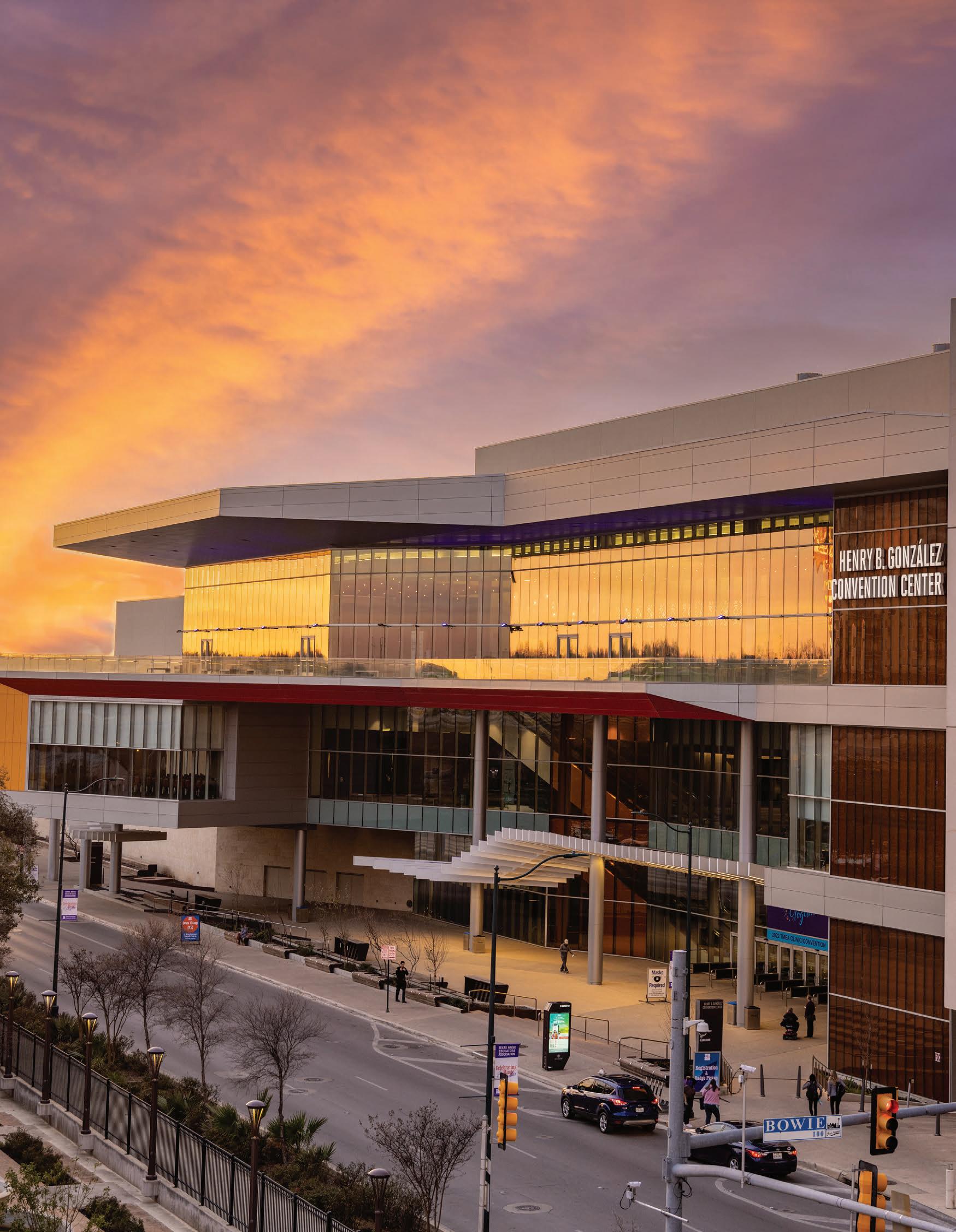




























































Music Changes Lives . . . . . . . . . . . . . . . . . . . . . . . . . . 11
This sampling of stories from TMEA members offers a compelling reminder of how music changes lives for the better.
Learn how candidates for the Texas Legislature and State Board of Education responded to our survey about fine arts education.
. . . . . . . . . . . . . . . . . . . . . . 14
Get advice on preparing for your first concert and on supporting students who participate in multiple school organizations.
. . . . . . . . . . . . . 26
After years of declining enrollment, now is the time to focus on the newest recruits for your program.
Expand Your Toolbox . . . . . . . . . . . . . . . . . . . . . . . . 36
by christine cumberledgeRegardless of how long you have been teaching, adding new strategies and methods to your teaching toolbox will help make your job easier and more effective.
Caring to Care, in Ways that Last . . . . . . . . . . . . . 42
by karin s hendricksTeaching is a caring profession, and now is a critical time for us to explore how we can show care for, about, and with music students.
A Prelude to Performance . . . . . . . . . . . . . . . . . . . . . 51
by lori schwartz reichlHow we introduce music to our students can enhance their interest, comprehension, and abilities.
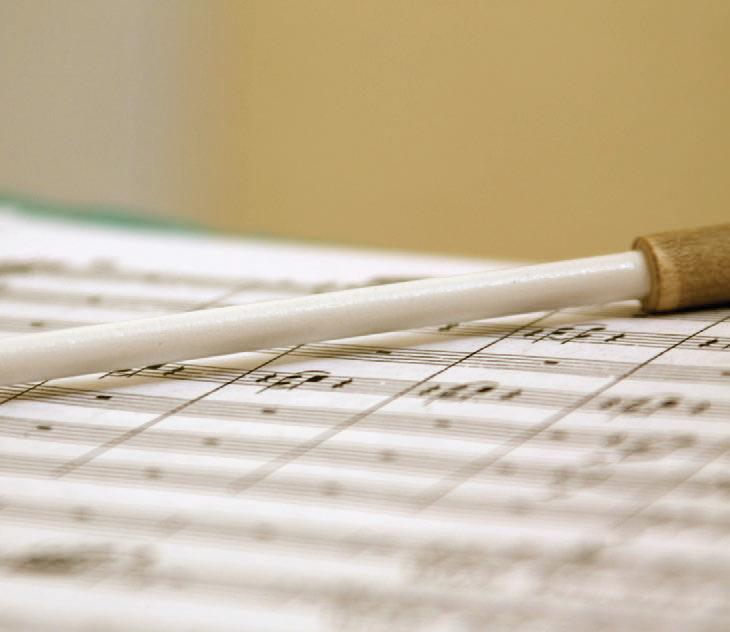
President Michael Stringer . . . . . . . . . . . . . . . . . . . . . . . 4
Executive Director Robert Floyd
Band Vice-President Shane Goforth
8
18
Orchestra Vice-President Ann G. Smith.......... 30
Vocal Vice-President Jesse Cannon II
Elementary Vice-President Katherine Johns
College Vice-President Matthew McInturf
38
46
54
TMEA Clinic/Convention: The Best Place to Learn
33
ON THE COVER: Tiffany Rodriguez, now a senior at Sharyland HS, performs with Mariachi Nuevo Cascabel during the 2022 TMEA Clinic/Convention. Photo by Karen Cross.Editor-in-Chief: Robert Floyd rfloyd@tmea.org | 512-452-0710, ext. 101
Managing Editor: Karen Cross kcross @tmea.org | 512-452-0710, ext. 107
President: Michael Stringer, Mesquite ISD mstringer@mesquiteisd.org | 972-882-7300
3511 Lake Champlain Drive, Arlington, 76016
President-Elect: Dana Pradervand-Sedatole, University of Houston pradervandd@yahoo.com | 713-743-3627
3606 Glenwood Springs Drive, Kingwood, 77345
Past-President: John Carroll, Monahans HS johnwoodromecarroll@gmail.com | 432-553-2780
809 South Betty Avenue, Monahans, 79756
Band Vice-President: Shane Goforth, North Shore Senior HS sgoforth@galenaparkisd.com | 713-516-7158
14122 Wadebridge Way, Houston, 77015
Orchestra Vice-President: Ann G. Smith, Plano East Senior HS ann.smith@pisd.edu | 469-752-9237
3000 Los Rios Boulevard, Plano, 75074
Vocal Vice-President: Jesse Cannon II, Fort Worth ISD vocalvp@tmea.org | 817-814-2635
1407 I.M. Terrell Circle South, Suite 2203-Room 02, Fort Worth, 76102
Elementary Vice-President: Katherine Johns, Floresville South Elementary kjohns@fisd.us | 830-393-5325
116 Oaklawn Drive, Floresville, 78114
College Vice-President: Matthew McInturf, Sam Houston State University mcinturf@shsu.edu | 832-515-8724
17 Hornsilver Place, The Woodlands, 77381
Executive Director: Robert Floyd | rfloyd@tmea.org
Deputy Director: Frank Coachman | fcoachman@tmea.org
Administrative Director: Kay Vanlandingham | kvanlandingham@tmea.org
Advertising/Exhibits Manager: Zachary Gersch | zgersch@tmea.org
Membership Manager: Susan Daugherty | susand@tmea.org
Communications Manager: Karen Cross | kcross @tmea.org
Financial Manager: Cristin Gaffney | cgaffney@tmea.org
Information Technologist: Andrew Denman-Tidline | adenman@tmea.org
Administrative Assistant: Rita Ellinger | rellinger@tmea.org
TMEA is pleased to offer several scholarships each year for undergraduate and graduate study in Texas. Last year, TMEA awarded $205,000 in scholarships to 69 students.

• Bill Cormack Scholarship: $3,000/year for up to five years.
• Past-Presidents Memorial Scholarship: $2,500/year for up to five years.
• Past-Presidents Scholarship: $2,500/year for up to five years.
• Executive Board Scholarship: $2,500/year for up to five years.
• One-year scholarships: $2,500 for one year only.
• TMEA awards one-year, $2,500 scholarships to current undergraduate students enrolled in a music degree program at a Texas college or university leading to teacher certification.
• TMEA awards one-semester, $2,500 scholarships to current college student members scheduled to student-teach within the two semesters following the application.
• TMEA awards a one-year, $1,250-to-$2,500 scholarship to students pursuing a music-related graduate degree at a Texas university.
and published by Dr. Clyde Jay Garrett. Published 1941–47 by Dr. Stella Owsley. by Grady Harlan. Purchased in 1954 by D.O. Wiley. Texas Music Educator was founded in 1936 by Richard J. 1954, the two magazines were merged using the name Southwestern Musician com until retirement in 1963. At that time ownership of both magazines was assumed by TMEA. Musician. OFFICIAL PUBLICATION OF TEXAS MUSIC EDUCATORS ASSOCIATIONLearn the fundamentals of playing and teaching the ukulele! Work with industry-leading performers and teachers, plus pick up readyto-teach arrangements and resources for your classroom If you have been wanting to bring ukuleles into your classroom but don’t have experience with the instrument, this class is for you.
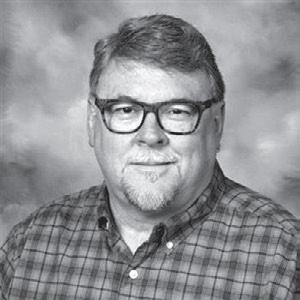


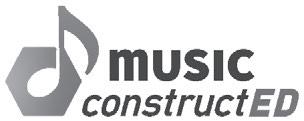
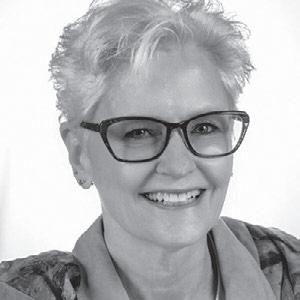


 MICHAEL STRINGER
MICHAEL STRINGER
Once we decide to complete each other instead of compete with each other, our whole thought process changes for the better.
Developing better leadership skills is an ongoing and never-ending process for educators. Each day, we must apply our leadership for our students to learn new skills and follow us as we teach them new concepts. I’m currently reading Leader Shift by John Maxwell to continue my journey to be a better leader. He focuses on developing a leadership style that encour ages and motivates others to learn new processes that will lead to success in the organization. The second chapter of Maxwell’s book is titled “Soloist to Conductor: The Focus Shift.” In it, I believe he does a wonderful job expressing the transition many of us have taken from being a singular musician to that of a leader of a large organization of learning.
I found it interesting that when Maxwell discussed leading others, he thought about it the same way many of us think about starting a new piece of music with our students: start slowly. He writes, “You’re a leader only if you have people with you. Your pace will be slower, but you will journey together.” I have told many student teachers over the years that you only have to be one day ahead of your students, and that will keep you moving along each day. I found it very interesting that Maxwell insinuated that you do not even have to stay one day ahead of those you are leading but simply right in line with them, so you all arrive at the same place at the same time. Of course, this doesn’t mean that your skills can remain at the level of your students, but instead, that you are always conscientious of where your students are in the process. Just because we can pick up a skill overnight (soloist mentality) does not mean that
October—Renew your membership and register for the convention.
October 6, 6 a.m. CT—TMEA convention housing reservation system opens online.
November 1 —TMEA scholarship online application deadline.
January 19 —TMEA convention early registration deadline.
February 8–11 —TMEA Clinic/Convention in San Antonio.
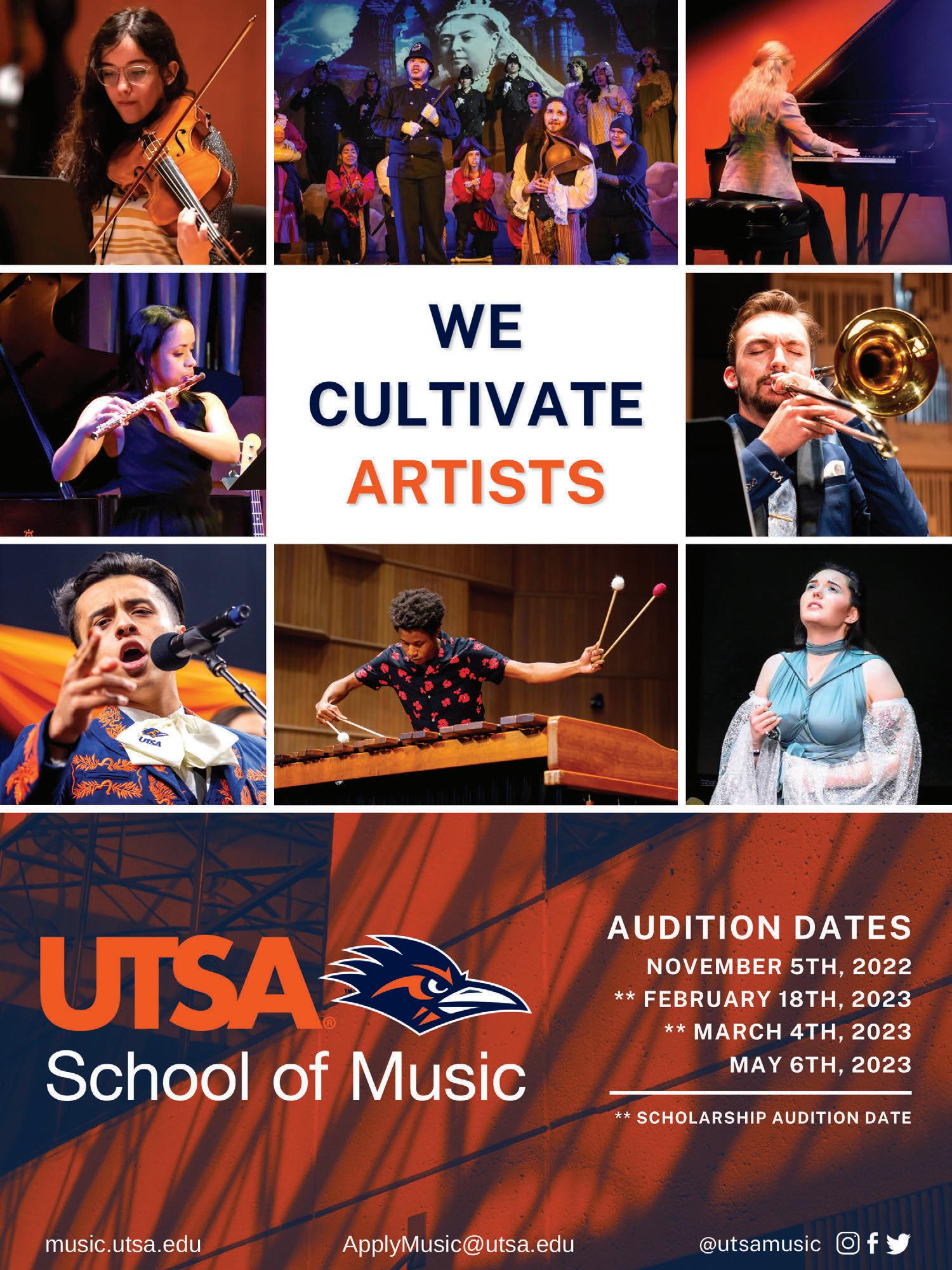
your students will pick it up at the same pace or rate. Maxwell also states, “If you’re at the top all alone, where are the people you’re supposed to be leading?” Each day we must look out and make sure those we are leading are in lock step with us and that the vision of the organization is being fulfilled.
It is no secret that a successful music ensemble is filled with people who have different personalities, goals, and priori ties. I also believe it’s understood that our students could never achieve as polished and wonderful a musical experience with out a great teacher.
As I read Maxwell’s book, I realized that far too often I didn’t take into consider ation how much I needed others to achieve the ultimate goal of the organization. It’s not that I didn’t always value my students and coworkers or that I thought I could get to the finish line all alone; I just believe that Maxwell helped me realize that we all need one another’s strengths and weak nesses. When I think about any project I have taken on—whether a concert cycle, an administrative task, or a new initia tive—I have strengths that must be used and weaknesses to overcome for success ful completion. In music we are fortunate to have a community of people around us who can offer help in our areas of weak ness, yet we are often hesitant to reach out to our community of scholars to help us
reach our educational goals.
We all know the value of a mentor–protégé relationship, especially as it applies to new teachers in our field, but have we ever considered that leaders of all experi ence levels need mentoring? While men toring for more experienced educators looks vastly different from the mentoring we give young educators, it is still vital to the success of our students. The longer I taught, the more I was aware of areas where I needed growth. Unfortunately, too often, pride stood in my way of asking for help. I was scared to show weakness to those around me and felt that I had been teaching far too long to need help in these areas. Luckily for me I had surrounded myself with great colleagues who were not scared to call me out and help me through my deficiencies.
Maxwell says, “After I focused on helping others, I began to understand how much I needed them.” He goes on to discuss the need to complete instead of compete. Once we decide to complete each other instead of compete with each other, our whole thought process changes for the better. In a competing mindset we are focused on winning and losing, singleminded thinking, and the exclusion of others, whereas in a completing mindset we are focused on shared thinking, finding win-win solutions, and including others.
As the beginning days of the school year are behind us and we enter the long haul of the school year, please remember
there are always people around you to help and offer support. I encourage each of you to find another person close to you and offer some help or guidance. In turn, reach out to others who do well in areas where you need assistance. I only wish I had not been so prideful and done the latter sooner in my career. When I used other people’s strengths to help overcome my weaknesses and gave my strengths fully to others, I discovered an entire new world of educa tion I had not had access to before. Then, and only then, I was able to create a class room where my students were also free to feel safe to excel and fail and focus on completion instead of competition.
Our convention is a great place where we all come together with a completing mentality. Over these four days, we share our experiences, seek help from others, and champion our colleagues as they present clinics and performances. Finally, with so many ways in which you can volunteer just a little time to the benefit of every attendee, this event is a perfect way to deliver on Maxwell’s notions of completion, not com petition (www.tmea.org/volunteer).
Our convention is also a wonderful opportunity to recharge, learn, and be inspired from those around the state and nation who will be sharing their strengths in education on a variety of topics. You are sure to find many that will help you address areas of weakness and allow you to make connections that will result in lasting relationships with other music educators.
I always leave our convention motivated and equipped with many tools that I can immediately implement in my classroom. Get ready to be inspired by all that the TMEA Clinic/Convention has to offer you and your students!
Go to www.tmea.org/convention to learn more and register. As of October 6, you can reserve your hotel room through TMEA’s reservation system. The week of October 6, TMEA will send an email from membership@tmea.org that contains the best link to use the day we open reserva tions so you experience the best possible website responsiveness. As always, before clicking on links in any email, check the full email address to verify its legitimacy. Each year, members and exhibitors report receiving scam and phishing emails that are related to our event.


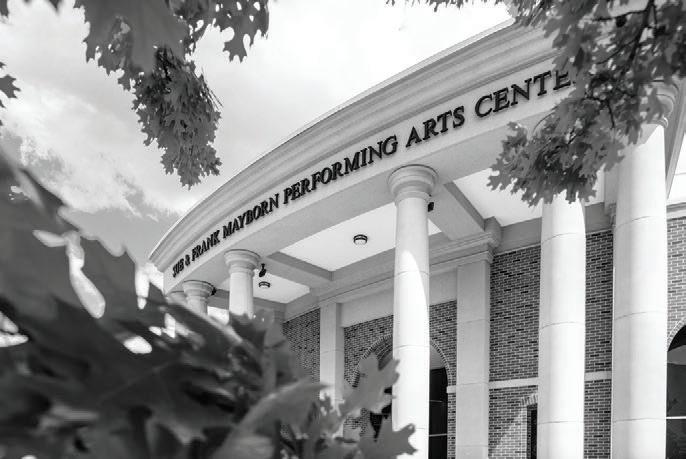


Halfway through this fall semester, we must ask ourselves where we are. Is this the new beginning, or the new normal, and if so, is there a new name? While answers to those questions are difficult to discern, the good news is that anecdotal stories reflect our continued recovery from the 29 months and count ing of the pandemic and the healing and growth of our programs. These stories speak volumes about the resiliency of music education and all that experiences in our classrooms represent.
What we do know is that the excitement of a new year is beginning to wane a bit. The grind and routine of the school year can start wearing on us. For band directors, certainly the preparation for UIL Marching Contest and other related festivals is building in intensity, and for all high school performance divisions, individual All-Region preparation is ongoing as is ensemble preparation for fall and holiday concerts. Middle and elementary schools are also preparing for a first performance of the year, and in some cases All-Region preparation is ongoing as well.
So what keeps us going when we need it the most, and equally impor tant, what can we do to help our students through these similarly chal lenging times? We have struggled for those answers throughout the last 29 months, but its core is worth repeating. First and foremost, it is maintaining and sustaining our own physical and mental well-being. That is fundamental to being an effective teacher in these days and times.
Secondly, for us as teachers and for our students, we must take advan tage of the sheer circumstance of being together and recognize that effective teaching and learning occurs when there is shared human expe rience between equals as Karen S. Hendricks reminds us in her feature
October—Renew your membership and register for the convention.
October 6, 6 a.m. CT—TMEA convention housing reservation system opens online.
November 1 —TMEA scholarship online application deadline.
January 19 —TMEA convention early registration deadline.
February 8–11 —TMEA Clinic/Convention in San Antonio.
The passion we share for our discipline and our belief that we touch our students’ lives like no other subject in the curriculum is the magic that binds us.
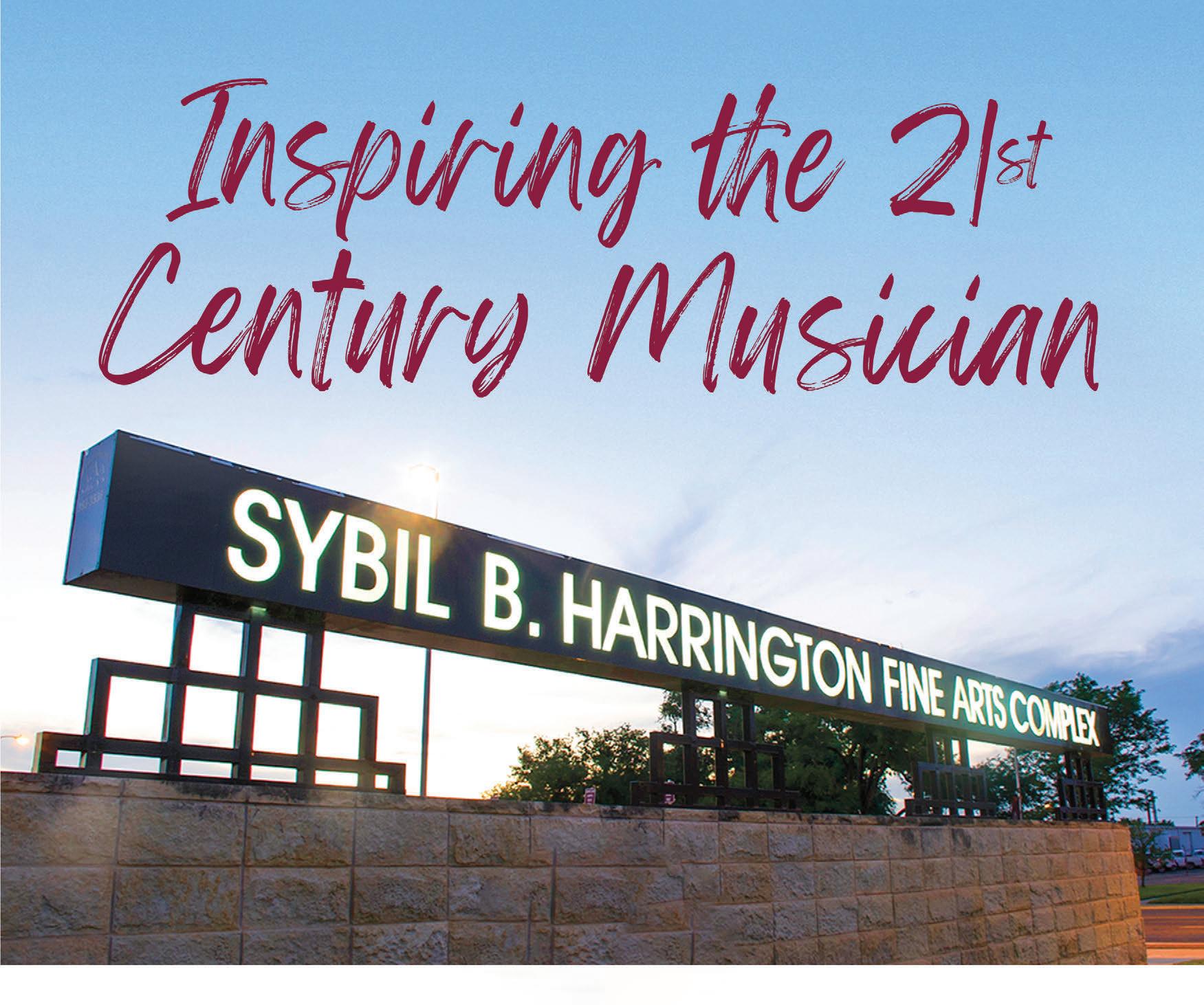
article on page 42. Admittedly, much of the time we are together with our students can become a grind because of the required mental and physical focus and repetition. We must continually remind our students it is difficult to experience joy alone and that true joy in one’s life comes from being with those you love and who share com mon interests and with whom you work together toward a shared goal.
In our classrooms we have the added benefit of anchoring the experience around music and the memories it brings through out one’s school years. Now that you have been teaching two months, this time of year can be a good time to pull out your happy file of notes, letters, and emails and texts you saved from former students, par ents, and even administrators expressing their thanks for how you influenced your students in a special way. We must always be mindful of how many students’ lives we touch daily in positive ways. Let those experiences be a rejuvenation of spirit and soul in these long days when we can some times wonder if all our efforts are worth it.
Though math was a love of mine in high school, and I eventually earned a college degree in it, I never took the time to write my high school math teacher—a treasured woman—a note of thanks. I did, however, write my high school and college band directors letters of thanks as they were in their final days. They shaped my life in ways no other teacher did because of who they were but also because of the nature of
the subject we shared.
I have had three feel-good moments in the last two weeks that have inspired me and reminded me of the importance of the work we do through the TMEA programs we sponsor as well as with our efforts in the political and policy arena at the capitol. One was a conversation at a social event with a highly respected educa tion policy expert who could not wait to tell me that his young daughter, Lauren, had just begun orchestra in middle school and had made the commitment for the orchestra students to be her tribe through out secondary school. He was overjoyed not only because Lauren had selected orchestra members as her friend group but also because he understood the value and takeaways of a quality music experience throughout middle and high school. He played in band in a small high school and spent two years as a music major prior to pursuing a law degree.
Two days later I had a conversation with a hotel sales executive negotiating a con tract for our convention. For the first ten minutes of the call, I could not get a word in edgewise. She had to tell me about her freshman daughter Susan’s story of hav ing to relocate from a small community where she attended a charter school with no music program to a large high school in a big city. In trying to help find Susan a place, the band director took her into the program and gave her the opportunity to learn the percussion book for the march
ing show and placed her in the drumline. Three years later Susan is president of this highly successful band program. The mother then urged me to keep up the fight at the capitol for all those children like her daughter. The praise, of course, goes to the band staff for finding a place for Susan and changing her life.
Finally, I have been out of the classroom for 29 years, so I thought my days of hear ing from former students had passed, but last week I got a letter from Clare, who played in the Berkner Band in 1975–1977. She simply wanted to tell me that after all these years she bought a horn, joined a community band, a brass band, and was also playing in a brass ensemble. She thanked me for introducing her to music and creating a love for music that after all these years she realized was something she could not do without in her life.
Of course, there are thousands of these stories waiting to be told, letters to be written, and emails and texts to be sent by students in hundreds of music classrooms across this state. If you are a new teacher, you will cherish that first correspondence you will undoubtedly receive. Back in the day, such correspondence was in hand written notes, and every time I pull that cardboard box out of the closet to throw away, I end up sitting on the floor for hours reading through and reminiscing about those times, wondering where that stu dent is now, and then shoving the tattered box back in the closet rather than into the recycle bin.
I opened my August 2020 column by telling the story of a podcast in which two authors were sharing their impressions of the pandemic’s impact on our country. When questioned where this was all tak ing us, one said that the only thing she knew for sure was that when we come down on the other side of this pandemic, “Everything that matters will last.”
Over two years later, it’s clear that our love for and connection with each other and our students has sustained us and our programs. The passion we share for our discipline and our belief that we touch our students’ lives like no other subject in the curriculum is the magic that binds us. Stay the course! Our students and you need it! For some truly inspirational stories shared by members about the amazing power of music, read the adjacent page. You might have a tissue handy. 0

TMEA members submitted stories about how deeply music has changed the lives of their students. Read this small sampling and be reminded that everything you do each day to support your students has a lasting effect on their lives.

I taught a student from a low socioeconomic area whose family struggled with substance abuse. He is the first to say, “If it wasn’t for choir, I’d be an addict.” In sixth grade, he entered choir already at the end of his voice change. He threw himself into learning everything he could about the voice and music theory. I then had the privilege of being his high school director. He struggled with depression and anxiety and choir was his outlet. Through his participation in our choir, the TMEA audition process, UIL, and ACDA, he now attends college on scholarship as a music major. He is the first in his family to attend college. Choir gives students a family of safety and support that allows them to take healthy risks.
One story sticks out that wouldn’t have happened without music. A choir student’s father had been released from prison and was taking the student in as their other parent had kicked them out. This father had no furniture, no kitchen supplies, and was working on getting a job. I got permission to share their needs with our choir. Parents showed up with trailers of furniture. People sent full kitchen sets, towels, bedding, bathroom, and cleaning supplies. They donated money and gift cards. Those students and parents changed the lives of two people in a desperate situation. Music is what brings us together. Service to each other is what keeps us going.
I taught a quiet bilingual student who was unsure of herself and emotionally fragile. She lingered one day after the others had left class and quietly asked if she could play the piano.
I told her she could and assumed it would be the usual chopsticks. She sat, put both hands on the keys, and proceeded to create original music that was so beautiful I had to sit down and close my eyes just to take it in.
A student who is blind came to us in sixth grade, never having played a wind instrument before, and we were able to set him up on euphonium. With the support of our visually impaired specialists, he learned how to read Braille music, connected with his peers, and excelled in his performance. He has placed in our top band and performs at a high level with his classmates. Music has not only given him an outlet to express himself, but it has also had a positive effect on his classmates. He is the happiest student on campus, and you can often hear him giggling with joy as he interacts with his band friends and performs in class.
Last year a third grader excitedly came up to me one day: “I’ve decided that music is my passion! I’m going to be a musician like you!”
We taught a very troubled sixth-grade student who had angered outbursts and ran away to evade problems. Starting this student in band meant a lot of work and stress. One day he was so enraged that he threw his school instrument down and burst out of class. While there were many more struggles along the way, we never gave up on this kid, and he kept showing up and wouldn’t give up on us. With our help, and that of many other teachers, he ended up sticking it out and ultimately became a high school drum major. You can’t know what students are capable of unless you give them a chance.
I received a call from a former student who I hadn’t heard from in six years. He called to let me know that he had joined the U.S. Navy and was about to board a nuclear submarine and receive a commission as the nuclear engineer on board. While he didn’t keep playing viola after graduating, he thanked me for everything he had learned in orchestra about concepts, logical and sequential learning and instruction, collaboration, and execution. He told me he used that training to learn nuclear engineering for the U.S. Navy. It’s one of my proudest moments.
A student I taught was in special programs, and I was warned her anxiety could manifest in dramatic ways. I decided to take a chance by asking her to narrate our program. Not only did she deliver the narration in our program flawlessly, but she also did it with great inflection and personality. She broke through barriers that had been placed in front of her and she shined! It was a truly humbling and amazing experience. It might have been easier to give the role to a star student in the grade level, but no one would have been as proud of their performance as she was.
This student had the potential to be an incredible percussionist but hadn’t been taught to read musical notation or rhythms and had no knowledge of rudiments, scales, or other fundamentals. She was willing to learn and had a great work ethic. I tried to convince her to audition for All-Region, but she thought she wasn’t good enough. I persuaded her to play a Class 2 solo in her ninth-grade year and she nailed it! This success and validation from the judge boosted her confidence. While she still wouldn’t enter a Region audition, the next year, she performed a Class 1 solo, memorized it, and received first division. Fast forward to twelfth grade, when she was the percussion section leader. She asked for the Region music and said she wanted this year to be her best! She made the top ensemble, qualified for Area, ranked in the top 10 of her school, and earned Outstanding Performer at TSSEC. Now she attends a prominent university, studies engineering, made the university band, and believes she can accomplish anything!


The majority of candidates for Texas House, Senate, and State Board of Education who responded to a recent survey distributed by TMEA said they believe fine arts education (music, theatre, art, and dance) improves student perfor mance in other academic areas, lowers dropout rates, and prepares students for college and the workforce. Additionally, most oppose the removal of students from their fine arts classes to study other subjects or participate in STAAR test remediation.
This is the seventh time we have surveyed state-level candi dates, and of all past surveys, these responses reflect the strongest level of support for the importance of fine arts education in a well-rounded education. Responses to four of the questions dem onstrated almost 100% agreement with the positive impact of arts study in the questioned area.
Similar to the surveys we conducted before the previous six state elections, this survey, distributed in late August, was intended to raise candidates’ awareness of fine arts education and remind them of the broad constituency who support fine arts education for all schoolchildren. This questionnaire allowed us to commu nicate important information while ensuring the candidate or their staff members dedicated additional time to considering their opinions and responses.
While many candidates are generally cautious about complet ing surveys, fearful their responses could somehow be used against them, 39% of the candidates have responded to date. Receiving candidate responses is a positive indication of their concern about our issues. Regardless of the response rate, sending a survey raises their awareness of a constituency that cares about fine arts educa tion issues.
Survey responses can also help you as you prepare to advocate with your elected officials for fine arts education during the 88th session.
Go to www.tmea.org/2022candidates to review your candidates’ answers to this survey. You can use their responses (or possible lack of response) as an opportunity to communicate directly with them. Thank them for responding and offer to provide them your firsthand experiences as a fine arts educator. Encourage your col leagues and parent groups to review the data and contact their can didates or elected officials to discuss their responses. Also encour age them to register with the Texas Arts Education Campaign to stay updated (www.txartsed.org/join-us). 0
What advice do you have as I approach my first concert as a new music teacher?
• Don’t take yourself too seriously. If in the middle of the program, you do something out of order, forget something, or mispronounce a name, it is okay! Recover and move on! —Caleb Lopez, Thompson IS
• The old rule of beginning with the end in mind has always been extremely helpful in planning scheduling, logistics, transportation, and communication with parents and admin istration. Working backward in your planning can help you make sure you don’t skip a step. The same is true in prepara tion for performances. —Anonymous
• Don’t over-program! With beginners, their first performance can be done during class time as a recital for just their parents. Keeping it simple will prevent unnecessary stress. We don’t need to push them with music they aren’t ready to perform or in an ensemble that’s too big to handle. Students who aren’t overwhelmed by their first performance will look forward to the first full ensemble performance. —Matthew Hiller, Smith MS
• Just like in the daily operations of your classroom, the more clearly you communicate concert procedures and expectations to students, the better. When thinking about expectations, consider normalizing how students might expect to feel on that day: will they be nervous or excited? How might they feel before and after the performance? Take time to prepare stu dents for these aspects in the days before the concert. Another important part of the first concert is interacting with parents and guardians. Consider how you can delegate some of the post-concert procedures to student helpers so that you can
meet and greet. Building relationships with those who came to see your students perform is just as important as the rapport you build with students. —Rick Palese, KIPP Austin Collegiate
• Overall, have fun and remember that these are children! Think of the worst possible things that could happen and prepare for them. Reassure the students, even if you’re freaking out on the inside. Have an emergency kit that includes extra reeds, oil, mouthpieces, sticks, mallets, and a first-aid kit. Run through everything in your mind several times. And again, have fun!
—Philip Gorden, Elgin IS
• Don’t spend too much time speaking. Make sure to recognize students for their accomplishments and thank volunteers for helping (as well as administrators for their support), but let the students’ performance speak for itself. That’s why the parents are there—to hear and see the students perform. —Stephanie Wlodkowski, New Waverly JH/HS
• We limit our performances to no more than an hour (includ ing all three band programs, three choirs, and theater arts performances). Once you envision the concert, work backward. Give yourself plenty of time for planning (at least a month). If you have a committee helping you (par ents, teachers, and/or students), share your logistics with them and let them know how you envision the concert will run. Most importantly, enjoy the concert! There is no greater joy than seeing our students progress and perform.
—Christian Rodriguez, Canutillo MS
• Write out a script so that you don’t ramble or so your students can be the emcee. Work with your students on how to get them and all equipment on and off the stage. Don’t forget to thank people (especially the custodial staff who will have extra work to do). Have fun! Enjoy the music and enjoy your stu dents. You only get one first concert!
—Erin Scalisi, Nimitz HS
Thanks go to TMEA members who offered responses to the following questions. Go to www.tmea.org/q&a to view additional answers to these and other questions or to suggest a question for a future issue.• Be prepared and honest with the mistakes you make. No mat ter how much you plan and prepare, mistakes always happen. It’s part of life, so accept it and just enjoy the process. Each year gets better and more comfortable, but stress never goes away. Do your best, communicate well all the way up to the concert, and understand that with kids involved, unexpected things always happen. Roll with it! —Kenneth Peters, Bellville HS
• Remember that you didn’t come into this world knowing how to attend a concert, and your students didn’t either. On the first concert, stick to something you know students will be successful with—you don’t need to go all-out with repertoire the first time. If you can delegate a concert night task, do it! —Rachel Warmanen, Trimble Tech HS
• Make sure all facilities have been scheduled well in advance and make sure there are no sporting events, religious events, school events, or other major local/ regional events at the same time. If you print students’ names in a program, have them double-check spellings prior to printing. Recognize adminis trators, board members, facility managers, fellow music direc tors, and volunteers at the beginning of the concert, and check with others in advance to be sure you don’t leave someone off. Success is rarely achieved alone. —Brian Sours, Tenaha ISD
• Get to know the program and its traditions as much as pos sible. With that said, make original choices that suit you and your ensemble. Sometimes fresh and new can be very welcoming. Focus on communicating what you are teaching the students as a focal point at the concert. Verbalize it in the

performance. This will show your audience that it is more than just a tune on a stage. —Dan Mays, Oak Ridge HS
• My advice is to be sure to accept help. Ask for advice and help from parents, faculty, and whoever else might be able to assist with resources, even providing food for the students that day. I have even had parents come to help with hair and makeup. I tried to do everything myself for years, but I do not hesitate to ask now! —Anonymous
• Have a specific uniform policy, even down to shoes and socks. Consider when students need to arrive. I recommend 15–30 minutes before start time, especially with younger ones. If pos sible, recruit a crew of students or parents in charge of setup and tear down. Be clear where students go before the perfor mance, where they unpack, store cases, tune, etc., and have a parent or teacher help direct them. Reserve seating for the students to sit together and watch the other groups perform, and ask some parents or teachers to sit with them. Go over audience etiquette ahead of time for students and again at the concert for the adults. If you teach younger kids who will need help tuning, recruit students, directors from the school you feed, or local music ed students to help with this. The kids will be excited and nervous to perform, and you will be as well.
—Louanne Greer, Young JH• Keep it simple. There’s no need to stress out and perform a 45-minute masterwork. Meet your students where they are. Show your parents what a typical rehearsal looks like for your opening concert. Be creative! —Timothy Brendler, IM Terrell Academy
• Think through every component. Imagine yourself as your most involved student in the concert and then as the least involved. What logistics will need to be clarified for each? How do they get to stage? How do they leave? Are there enough chaperones/teachers helping? Are there tracks to play? Where should the piano be? Will students need to change for any reason, and if so, where? What pre-concert announce ments need to be made? What recognitions should be made? —Andrew Steffen, Richland HS
• Don’t over-program. Keep music selections simple so that you and the students perform confidently. —Tiffany Hammock, Jacksonville HS
• Practice walking on and off stage, especially on and off risers. If possible, practice on stage the day of or before the concert. Practice where they will sit as audience members and have parents sit with them. Get permission from parents to print student names in programs. Request an administrator to be present. Know your microphone needs, and write out every thing you want to say so you don’t forget in the stress of the moment. Twenty-seven years in and I still write them out! I believe for middle school/junior high, anything over 45–60 minutes is too long and no more than 90 minutes for high school. —Anonymous
• Make sure to reserve the performance space early and request air conditioning! This is Texas after all, and the building gets hot quickly! —Anonymous
• The students must know the music. Start by saying it, then clapping rhythm, then singing solfège, then singing individual parts, then all, and finally putting silly movements to parts that are really hard. The better they know each nuance/word/ note of the piece, the more chance they have of being success ful. —Anne Summitt, Club Hill ES
• Schedule the auditorium well in advance to avoid conflicts. Don’t be afraid to ask for help—I taught a coach to run the soundboard and convinced a self-proclaimed non-artistic aide she could create a masterpiece for our decorations, and she did. Include parents in costuming. Don’t try to do it all yourself! Know that you will have bad performances, so don’t get discouraged, just reevaluate, learn from it, and improve each time. Finally, don’t sweat the little things (like stripping on stage, putting a finger in a friend’s ear, etc.). Families just love seeing the kids up there performing and being amazing! —Will Moncrief, Post ISD
so you can work around each other. Especially in smaller schools, you must acknowledge your shared kids are the best kids. They are stressing themselves out and stretching their schedules thin for you, so the least you can do is accommodate them, not the coaches/sponsors. Do not be stubborn about scheduling, because in the end the ones hurt the most are your students. —Ismael Mendoza, San Augustine HS
• Our administrators and program directors meet weekly to discuss the calendar, practice and rehearsal schedules, games, contests, concerts, and transportation needs for the current and following week. This is when we resolve any conflicts, with everyone in the room. We also utilize a Triangle Philosophy, in which classroom academics, athletics, and fine arts are the triangle’s three points. We defer to the point with the greatest need at different times of the year (contest season, playoffs, state testing dates). Every ISD employee understands the triangle, and it has made conflicts easier to navigate during critical times of the year. —Brian Sours, Tenaha ISD
• It is vital to communicate and cooperate with campus administrators and all coaches/leaders. Attending your students’ other events will mean the world to them, and it means a lot to the parents, coaches, and administrators to see you take time from your schedule to support the kids. I take pictures of my students playing football, volleyball, softball, baseball, and other activities and send them to their coaches. The most important aspect of doing this is that it must be genuine. It should not feel like a job or task, but rather a privilege to see your students do something other than what they do for you every day in your class. —Santiago Ochoa, Medina ISD
• Students who are well-rounded have the best opportunities for future scholarships, regardless of discipline, so we strive to create a balance among all activities for optimum success. —Josh King, Beckville ISD
• We are a small school and talented students tend to be good at music, sports, and every other activity offered. We try to schedule ensemble rehearsals that are not part of the school day before school so they don’t interfere with afterschool sports. —Wade Butin, Providence Classical School
• If a student is willing to make the effort and sacrifices to be involved in multiple things, educators and mentors should do what we can to help them be successful. Too many students drop out of band, sports, choir, and even school because they are not being supported. They are pressured to choose, and that is not right. What we (coaches and directors) tend to forget is that these are children and they should be allowed to do everything they can physically and mentally, as long as they can handle it. —Philip Gorden, Elgin IS
• I meet with the athletic director early in the summer and go over summer practice schedules. Usually we find a compromise. Then once school starts I have practices in the evening for marching season because the students have so many other activities that are right after school. We are a small school, and we understand that students must do multiple events for any organization at the school to survive. —Anonymous
• Take the initiative to reach out to all coaches and sponsors and get their practice and event schedules as early as possible
• My school started “Fine Arts Wednesday” rehearsals, and it has worked well for us for many years. All athletes are excused from practice 3:30–5 p.m. on Wednesdays to go to their once weekly fine arts rehearsal. Conflicts are resolved between the athletic director and fine arts department head. We are a small school and students are involved in many activities. —Kim Maxwell, Faith West Academy
• We typically share student time. Students are responsible to decide what half of practice or rehearsal to go to and communicate with directors and coaches. Performances or
How do you successfully share students so they can participate in multiple organizations?
•
games take priority over rehearsals and practice. Students will often hesitate to communicate with coaches for fear of being treated unfairly with playing time, so it is important to help them if this is the case and reach a compromise with the coach or teacher. The challenge is making sure the student is the one making that choice, not the teacher or coach. —Dan Mays, Oak Ridge HS
As an orchestra director, I used to believe that recruiting students was one of the most important strategies for the health and longevity of our programs. I’ve since learned that some of the best people you can recruit to your team are the head directors of the other music ensembles on campus. When physical space is limited, and fine arts students are often shared with other organizations, collaboration is key. We are part of the same musical ecosystem in our school. We need each other. I need band. I need mariachi. I need choir. I need dance. This is our school. —Fabian Lopez, Economedes HS
• Frustrations often occur when assumptions are made and communication is not a priority. Once a schedule has been set, let it play out for two weeks and then reassess—is this working for all parties? If not, why? What can be done to make things better? —Timothy Brendler, IM Terrell Academy
• Especially with new students, talk with them one-on-one about how to navigate and communicate about schedule conflicts that arise. They need to know you’re there to help with any tricky situations. While it’s important to teach students how to communicate properly, it is not their place to be put in the middle of working out major conflicts. Also, be prepared
to compromise on your rehearsals or offer solutions where you don’t always win, in terms of your rehearsal time. What’s most helpful for the student is showing them that compromise is often the best solution. —Andrew Steffen, Richland HS
• Every month, I create a rehearsal calendar that I ask students to share with the other adults in their lives in case we need to work something out. I have never really had trouble with splitting rehearsal/practice time after school. Most coaches publish their game schedule early enough in the semester that I can be flexible with concert dates so no one has to choose which event to go to. —Rachel Warmanen, Trimble Tech HS
• I have an elementary afterschool honors music group, and haven’t had issues within the school regarding schedule conflicts. During elementary UIL season, I may miss a few kids who have to practice, but we just work it out. The conflicts I experience are from community groups like youth sports leagues and others. Still, I have found there is common ground that can be found if you communicate with them. —Will Moncrief, Post ISD

• When I taught secondary, I watched too many students struggle with adults who made them feel bad for wanting to miss a practice for our performance or contest. I made it my policy to speak with the adults as long as students would let me know about conflicts in advance. I always advocated for my choir students, and I was always willing to compromise. We ended up having lots of wins for everyone involved.
—Leslie Hooe, Grapeland ES 0
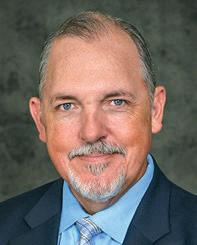
Any progress made by your students musically, academically, or otherwise is success and it moves you closer to your goals.
Ah, October. The temperatures drop below 90 (at least some days), a few leaves start to change color, and the school year is now well under way. The goals you wrote, along with the plans you made, and the processes you designed to implement them have been tested. Just over two months ago, you returned from the TBA convention full of ideas and inspiration, but I suspect that motivational fire is getting contained by the challenges you face in the educational environment every day. The clarinet embou chures are not all fixed, the brass range hasn’t improved as you had hoped, you still have kids out of step, and even after a month and a half of your new sightreading system, the band still misses the key. If you are anything like me, it’s around this time of the year that the proverbial judgmental voice in your head is saying, “Your plans have been weighed, measured, and found wanting.”
When I hear that voice, I remind myself of three of the truths that have gotten me through the challenges of life thus far.
Can is the truth. Can’t is a lie.
One excuse equals total failure.
You don’t fail until you quit.
You can do it. It wouldn’t be difficult for us to fill every page of this issue and countless others with the true stories of those who have over come tremendous challenges to accomplish the things they set out to
October—Renew your membership and register for the convention.
October 6, 6 a.m. CT—TMEA convention housing reservation system opens online.
November 1 —TMEA scholarship online application deadline.
January 7—Area Band and Vocal auditions.
January 19 —TMEA convention early registration deadline.
February 8–11 —TMEA Clinic/Convention in San Antonio.
SHANE GOFORTH

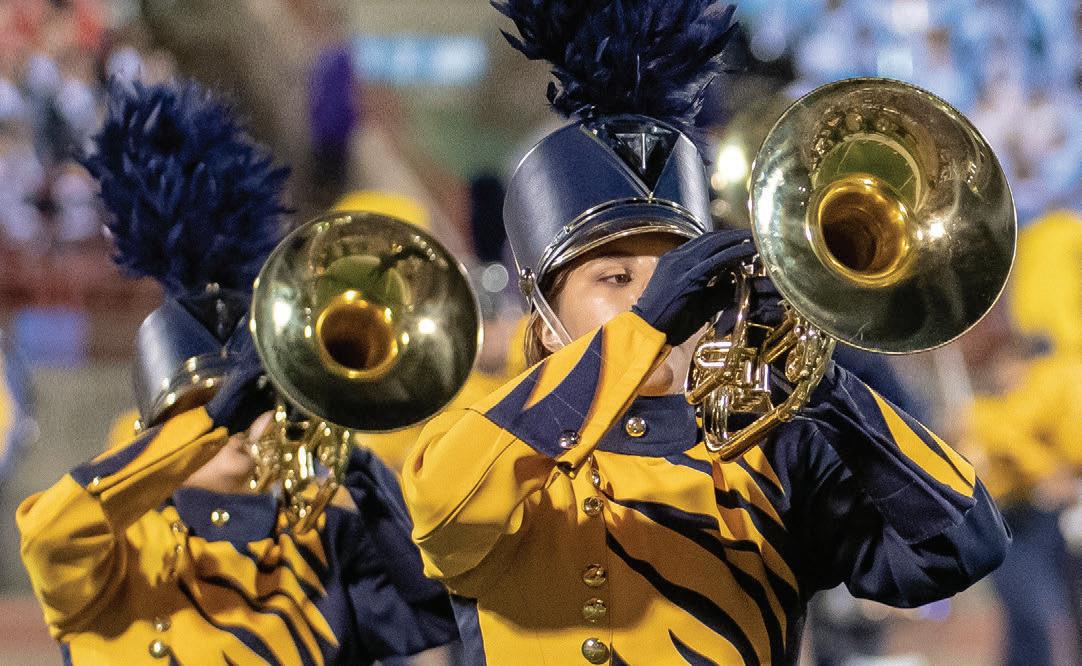

do. If you are having a difficult time thinking of any, go watch Miracle or read a good Abraham Lincoln biography and then come back to the article. (Pause for reflecting or research.) Now that you are properly inspired, don’t forget that the people in those stories are just that—peo ple—talented, intelligent, beautiful human beings just like you. And like you, they had dreams that they turned into goals, that they then began to pursue. And just like you they ran into a myriad of obstacles, but they persisted because they knew they could accomplish their goal. So, now you must decide what you believe to be the truth and more importantly, what you will do with it.
I encourage you to remove the word can’t from your vocabulary and do every thing you can for your students to do the same. I honestly believe can’t has no place in the syntax of an educator. You would never wittingly lie to your students, so why lie unwittingly by using a word that robs you, your students, and your program of your full potential? History is full of exam ples of this most egregious lie. We can’t fly. We can’t land on the Moon. We can’t operate on the heart. A bunch of college
kids can’t beat the greatest Russian hockey team ever assembled. (Watch Miracle. I promise it’s worth the two hours.) And, while we’re at it, let’s get rid of excuses. When we make an excuse, we are simply saying, “We can’t because . . .” and since we have already established that can’t is a lie, then there is no need to make excuses.
You and your students can accomplish anything you want, and that is the abso lute truth. The problem is that success does not always abide by our schedules. Success often has a way of being redirected, restricted, and delayed by all manner of external forces. So, in your vocabulary purge, take a close look at the word failure.
Just because you have not met some prede termined metric by some predetermined time does not mean that you have failed. Any progress made by your students musi cally, academically, or otherwise is success and it moves you closer to your goals.
Since I would never want to appear as someone who merely subtracts from your vocabulary, I encourage you to explore the power of yet. Instead of “We failed to meet our goal,” consider “We have not met our goal yet.” The idea of failure robs you and your students of positive energy and
momentum built by the progress you have made. The concept of yet builds on the suc cess you have worked for and encourages you to persevere through any obstacles that may be placed in your way.
That voice in your head is wrong. Your plans are great, and you can be the master teacher you desire to be. Just keep working, and never forget that you don’t fail until you quit.
If you haven’t yet, be sure to register to attend the convention and secure your housing via TMEA’s reservation system that opens October 6 at 6 a.m. CT. During the week of October 6, TMEA will send an email from membership@tmea.org that contains the preferred link to use the day we open reservations so you experience the best website responsiveness. As always, before clicking on links in any email, check the full email address to verify its legiti macy. Each year, members and exhibitors report receiving scam and phishing emails that are related to our event.
I am excited to announce the incredible lineup of our 2023 Band Division All-State Conductors. I hope you will make time in
Pearl knows drums. And we know music teachers. Together, we can add more boom to your band or drumline with our our complete selection of Pearl drums and percussion.
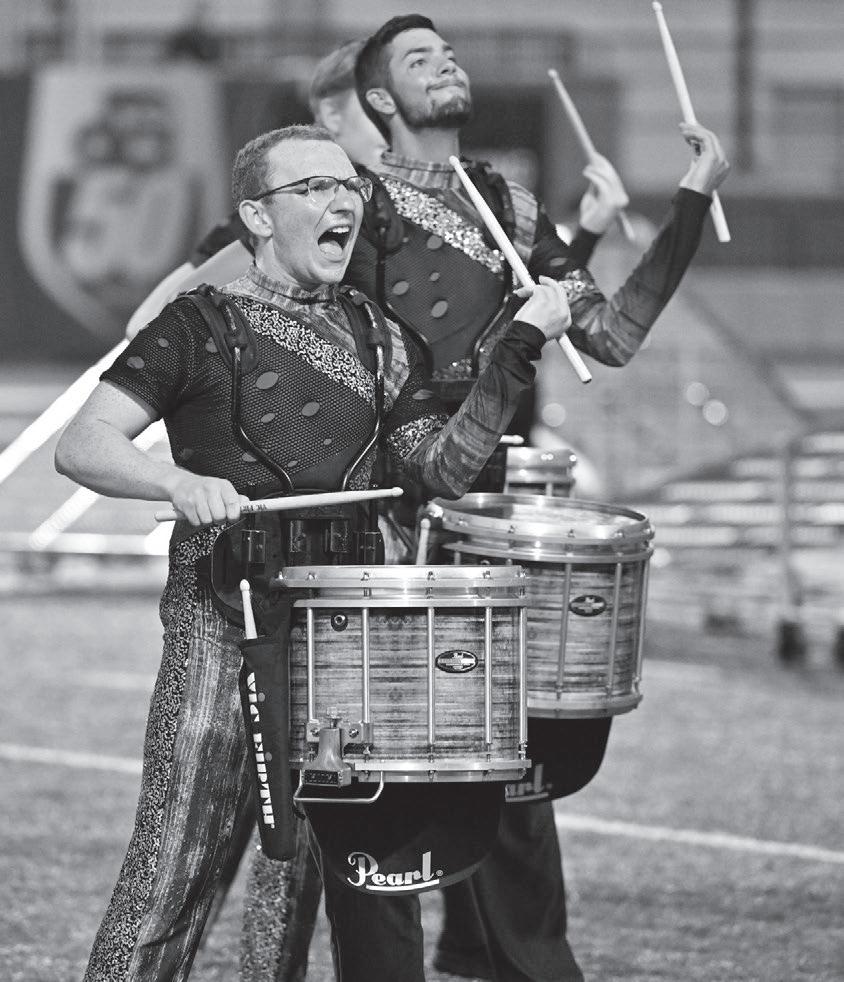
your convention schedule to watch these master teachers and musicians rehearse and perform with our incredible All-State students.
Emily Threinen serves as Director of Bands at the School of Music of the University of MinnesotaTwin Cities. In this position, she conducts the acclaimed University Wind Ensemble and provides administrative leadership for all aspects of the university’s band program.

Threinen consistently works with com posers, arrangers, and performing artists of varied disciplines. She has been pub lished in multiple volumes of the Teaching Music Through Performance in Band book series, where she has been recognized as a strong scholarly contributor. She is active across the nation and abroad as a guest conductor, clinician, and conference presenter.
Threinen is a strong advocate for music education and is proud to serve as a Yamaha Master Educator.
Threinen is a native of Minnesota and is a graduate of these institutions: University of Minnesota-Twin Cities, Northwestern University in Illinois, and the University of Michigan.
John Lynch is currently Director of Bands and Professor of Music at the University of Wisconsin Stevens Point and was formerly Director of Bands at the Sydney Conservatorium of Music. Prior to that he served as Director of Bands and Professor of Music at the University of Georgia and the University of Kansas.
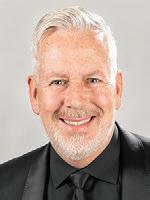
He was the conductor of Chicago’s Northshore Concert Band, the Atlanta Youth Wind Symphony, and founder of the Greater New York Wind Symphony and the KU/Kansas City Youth Wind Symphony. A passionate advocate for new music, Lynch has commissioned, recorded, and premiered works from around the globe with a focus on diversity.
He is a recording artist with Naxos and Klavier Records. Lynch is the recipient of
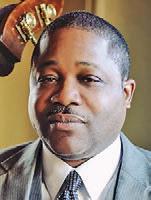
the American Prize, the Georgia Creative Research Medal, the Stanbury Award for outstanding teaching and conducting, and a Northwestern University Searle Fellow for Teaching Excellence. He holds degrees from Indiana University, the Eastman School of Music and the Cincinnati College-Conservatory of Music.
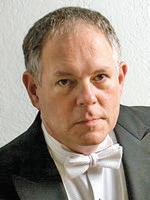


Dennis Llinás serves as Associate Professor of Music and Director of Bands at the University of Oregon, where he oversees the Department of Bands, conducts the Oregon Wind Ensemble, and teaches con ducting and wind literature. Previously, he was the Associate Director of Bands at Louisiana State University, where his responsibilities included conducting the LSU Symphonic Winds, teaching under graduate and graduate conducting, and directing the Tiger Band.
As a conductor and clinician, Llinás has conducted the Dallas Winds, World Youth Wind Orchestra Project in Austria, Universidad de Bellas Artes in Colombia, honor bands throughout the U.S., and presented at numerous state and national conferences. Llinás’s compositions have been performed by musicians in the Strasbourg Conservatory in France, Dallas Winds, and other universities through out the U.S. Llinás earned degrees from Florida International University and the University of Texas at Austin.
Rodney Whitaker, an internationally renowned bassist, is a Distinguished Professor of Jazz Double Bass and Director of Jazz Studies at Michigan State University and is one of the leading performers and teachers of jazz double bass in the U.S. Whitaker is a lifetime member of the Lincoln Center Jazz Orchestra, conductor/bassist for the Dr. Phillips Center Jazz Orchestra, and director of the Geri Allen Fellows Gathering Orchestra.
Whitaker toured extensively with famed jazz trumpeter Roy Hargrove. In addition, he has appeared and presented master classes at the International Association
of Jazz Educators Conferences, Barbican, Duke University, Howard University, and countless other universities. Whitaker is featured on 150+ acclaimed recordings.
Whether as bassist, composer, record ing artist, educator, or mentor, Whitaker whole-heartedly embraces jazz legacy’s life-force with an integral pledge of dis tinction, integrity, and great promise.
Will Campbell is the Director of Jazz Studies and Professor of Saxophone at UNC Charlotte. He holds a DMA in saxophone perfor mance and literature from the University of Illinois Urbana-Champaign and a BM in jazz studies and MM in saxophone per formance from the University of North Texas, where he was a member of the One O’Clock Lab Band and directed the Three O’Clock Lab Band.
From 1990 to 1994, Campbell toured internationally as a member of the Harry Connick, Jr. Orchestra. Recording credits include Blue Light, Red Light, When My Heart Finds Christmas, and The New York Big Band Concert. In 2007, he released Think Tank, his debut recording as a leader and composer. Campbell is also a member of Unhinged Sextet, a coopera tive jazz ensemble that has released two recordings, Clarity and Don’t Blink
In 1995, he was awarded a National Endowment for the Arts Jazz Fellowship Grant, which allowed him to study with Dick Oatts in New York. Campbell is an Artist/Clinician for the Conn-Selmer Company and a Performing Artist for D’Addario Reeds.
It is difficult to find any aspect of marimba technique, repertoire, or instrument design that has not been profoundly changed by the work of Leigh Howard Stevens. According to Time magazine, “Stevens has revolution ized the playing of the instrument.” His one-handed rolls, mallet independence, contrasting roll types, and birch-handle mallets are now commonplace in modern marimba playing.



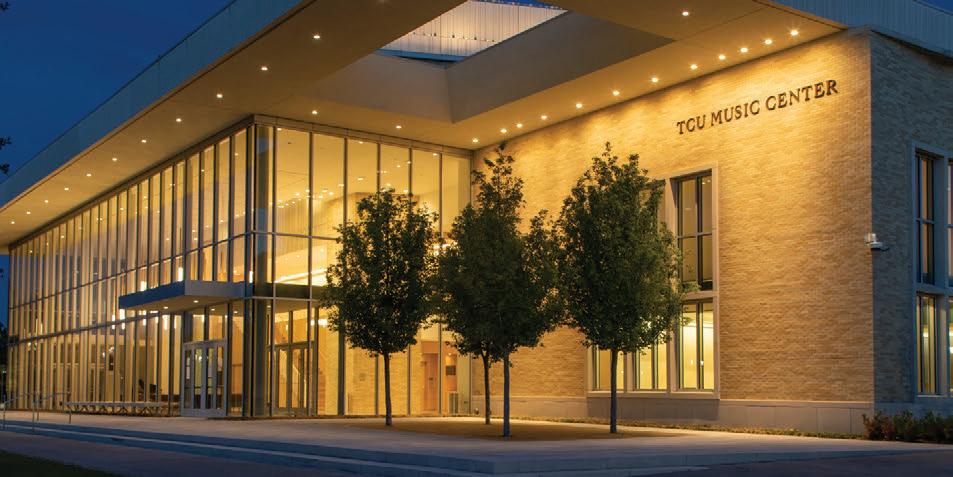
His fresh approach to music-making on the marimba greatly expanded the instru ment’s compositional possibilities, stimu lated composer enthusiasm for the marim ba’s use in solo and chamber music and ultimately led to a series of more than 30 world premiere performances by Stevens.
His original concepts are outlined in his book Method of Movement, published in six languages. He has been awarded nine U.S. patents, featured in numerous periodicals such as The Wall Street Journal and The New York Times , and among many other honors, has been elected into the Percussive Arts Society Hall of Fame. Stevens taught for many years at the Royal Academy of Music in London, England, where he was professor of marimba.
James Campbell, 5A Percussion Ensemble
James Campbell has received worldwide recog nition as a performer, ped agogue, and author, and he is a respected figure in the development of the contemporary percus sion ensemble. He has toured extensively throughout the Americas, Europe, and Asia.
Currently Provost’s Distinguished Service Professor of Music and Director of Percussion Studies at the University of Kentucky in Lexington, he also holds the positions of Principal Percussionist with the Lexington Philharmonic and drum mer with the Kentucky Jazz Repertory Orchestra.
Campbell also serves as Past-President of the Percussive Arts Society (PAS) and received their Lifetime Achievement in Education Award in 2019. He was inducted into the PAS Hall of Fame in 2021, an honor that recognizes the contributions of the most highly regarded professional leaders in percussion.


Campbell is an artist and endorsee for Innovative Percussion, Evans Drumheads, and Meinl Percussion. He is an Artist and Educator for the Avedis Zildjian Cymbal Company and a Performing Artist for Yamaha Corporation of America, Band & Orchestra Division.
0
Arbor Creek MS Honors Band Kimberly Beene Carrollton, TX Colleyville MS Honors Band Lauren Jones Colleyville, TX
Grisham MS Honors Band Liz Love Austin, TX
Maus MS Wind Ensemble Katie Lewis Frisco, TX
McKamy MS Honor Winds Russell Cote Flower Mound, TX
North Ridge MS Honors Band Jessica Shadman & Scott Dupre North Richland Hills, TX
Shadow Ridge MS Honor Winds Ross Patterson & Adrienne Schuster Flower Mound, TX
Smithfield MS Honors Band.............................Joshua Schechter Nor th Richland Hills, TX
Timberview MS Wind Ensemble Ryan Straten Fort Worth, TX
Aledo MS Honor Winds Joey Qualls Aledo, TX
Argyle MS Honor Winds Evan Fletcher.................................................Argyle, TX
Briscoe Honor Band Mark Keene Richmond, TX
Canyon Vista Honors Band Jay Hagy Austin, TX
Cedar Park MS Symphonic Band Britni Hummel Cedar Park, TX
Cobb MS Wind Symphony Elizabeth Treadwell Frisco, TX
Coleman MS Symphonic Band David Ingram Waxahachie, TX
Coppell MS West Honor Winds Greg McCutcheon Coppell, TX
Faubion Honors Band.......................................Ryan Gaughan McKinney, TX
Hofius Symphonic Band Jennifer Wren Spring, TX
Kranz JH Honors Band Kelby Koch Dickinson, TX
Ar tie Henry MS Honors Band Robert T. Herrings, III............................Cedar Park, TX
Killian MS Honors Band Trevor Ousey Lewisville, TX
Spillane MS Symphonic Winds John Bar ton Cypress, TX
Ulrich Wind Ensemble Mike Rogers Klein, TX
Walsh MS Honor Band Jennifer Bergeron.................................Round Rock, TX
Wester MS Wind Ensemble Brad Smith Frisco, TX
Wiley MS Wind Ensemble Taylor Williamson Leander, TX
Kinder HSPVA Symphonic Band Stephen Crawford Houston, TX
North Lamar Symphonic Band Randy Jones Paris, TX
Tenaha HS Symphonic Band Brian Sours Tenaha, TX
Colleyville Heritage Wind Ensemble Gary R Barnard Colleyville, TX
Friendswood HS Wind Ensemble Brett Nelson Friendswood, TX
Hewitt-Trussville HS Wind Ensemble Dr. Mike Guzman Trussville, AL
Jordan HS Symphonic Band Daniel Galloway Fulshear, TX
Lovejoy HS Wind Symphony Paul Heuer Lucas, TX
Southwest HS Wind Symphony Jeff DeMaagd Fort Worth, TX
Wylie East HS Wind Symphony Gregory Hayes Wylie, TX
Allen HS Wind Ensemble Philip Obado Allen, TX
Clear Springs HS Wind Ensemble Lester Williams League City, TX
College Park Wind Ensemble Jeffrey P. Gorring The Woodlands, TX
Dawson HS Wind Ensemble
Aaron Brown Pearland, TX
Hebron HS Wind Symphony Andy Sealy Carrollton, TX
Keller HS Wind Ensemble Mark McGahey Keller, TX
Klein Oak HS Wind Ensemble Todd Clearwater Spring, TX
Lake Ridge HS Wind Symphony Brad Bonebrake Mansfield, TX
Lone Star HS Wind Symphony Mark Poole Frisco, TX
The William Mason Wind Symphony Ed Protzman Mason, OH
Pearland HS Wind Ensemble Kenneth Brown Pearland, TX
Richardson HS Wind Symphony Christopher Bronson Richardson, TX
Timber Creek HS Wind Symphony James Barnes Fort Worth, TX
Keller HS Wind Ensemble Mark McGahey Keller, TX
Legacy HS Wind Symphony Andrew Nance Mansfield, TX
Berry Miller JH S Honors Band Chris Bennett Pearland, TX
South Grand Prairie HS Wind Ensemble Michelle Ross Grand Prairie, TX Tidwell MS Wind Ensemble Renee Quinlan & Rothman Tafel Roanoke, TX
Special thanks to adjudicators Anthony Maiello, Fred Allen, Larry Livingston, and Robert Carnochan.
Beck JH Honor Orchestra Barb Nelsen Katy, TX
Beckendorff Jr. High Honor Orchestra Amy Williams Katy, TX
Canyon Vista MS Honors Orchestra Ragan Whatley Austin, TX
Central JH Chamber Orchestra Tara Truex Euless, TX
Doerre Int Chamber Orchestra Rowina Torres McKee Klein, TX Faubion MS Honors Orchestra Kari Zamora & Brandon Berens McKinney, TX
Fort Settlement MS Chamber Orchestra Angela Peugnet Sugar Land, TX
Seven Lakes JH Chamber Orchestra Jennifer Gingell & Bethany Hagin Katy, TX
Canyon Vista MS Symphony Orchestra Ragan Whatley, Jay Hagy............................Austin, TX
Dulles MS Symphony Orchestra Sally Kirk, Edward Odeh, Regan Vogel, Tiffany Ye Sugar Land, TX
Stephen F. Austin Camerata Ann Victor Sugar Land, TX
Klein Cain HS Chamber Orchestra Sundas Mohi-Truong.................................Houston, TX
Cinco Ranch HS Sinfonia Orchestra Brett Nelsen & Oscar Vera Katy, TX
McKinney HS Chamber Orchestra Jef f Harvick McKinney, TX
Seven Lakes HS Sinfonia Orchestra Desiree Overree Katy, TX
Allen HS Symphony Orchestra David DeVoto Allen, TX
Round Rock HS Symphony Orchestra.............Sandra Vandertulip Round Rock, TX
Seven Lakes HS Symphony Orchestra Desiree Overree, John Mays, Sean Carlton Katy, TX
Houston Youth Symphony
Michael Webster Houston, TX
Special thanks to adjudicators Robert Franz and Larry Livingston.
Acton MS Varsity Treble Choir Randall Walters Granbury, TX Cook MS Varsity Treble Choir True Hernandez Houston, TX
Trinity Springs MS Varsity Treble Choir Clinton Hardy Keller, TX York JH Chamber Choir Chaz Robilotto......................................................................................................................................Spring, TX
Spillane MS Tenor/ Bass Choir Nicole Bouley Cypress, TX Trinity Springs MS Chamber Mixed Choir.....................................................................................................Clinton Hardy Keller, TX
Bridgeland HS Chorale Christopher Fiorini
Cypress, TX Granbury HS Varsity Mixed Choir Kendra Fisher Granbury, TX Montgomery Madrigals Heather Orr Montgomer y, TX
Lake Creek HS Chorale Women Cameron Carnley......................................................................................................................Montgomery, TX Montgomery HS Chorale Women Heather Orr Montgomer y, TX
Grand Prairie Fine Arts Academy Tenor-Bass Singers
Joel Duar te Grand Prairie, TX
Special thanks to adjudicators Amanda Quist, Jamie Bunce, and Samuel Scheibe.
Reynolds MS Jazz Band Tina Parr Prosper, TX Vela Jazz I Erika R. Uribe Harlingen, TX
Aledo Jazz 1 Jake Albin Aledo, TX
Paschal Jazz Ensemble I Mat t Sawyer Fort Worth, TX
H.B. Plant HS Jazz Band Brian P. Dell Tampa, FL
Special thanks to adjudicator Aaron Lington.
Klein Oak HS Percussion Ensemble Max Mullinix Spring, TX
Wakeland HS Percussion Ensemble Brian Teed Frisco, TX
Kerr MS Percussion Ensemble Andrew Klein Burleson, TX
Special Thanks to adjudicator She-e Wu.
Declining enrollment is a reality many directors have struggled with over the past two years. Whether it was a sudden drop or a slow trickle, many have seen stu dents exit band, orchestra, and choir programs. With a myriad of factors driving that trend, recovery can be especially challenging. And while it’s undoubtedly a challenge, it is one we can overcome. With that in mind, now is an excellent time to refocus efforts on recruitment, especially for your newest program members—sixth graders!
If you wait until the official start of your campus recruitment window, you might be too late. At Keller and Killian Middle Schools, all students, including fifth graders, make decisions about the next school year as early as February. We also know from expe rience that many fifth graders make up their minds well before that point. With so many factors influencing their decision and with their choices being made so early, you must make yourself and your program as visible as possible in the fall semester.
Before you begin any recruitment activity, meet with all the respective parties involved in the course registration process, including counselors, principals, program directors, team leaders, and other teachers. Know how many electives a sixth grader can take and how many choices are offered at your school. Find out if certain classes have enrollment caps or prerequisites. Explore dis trict requirements and potential roadblocks to student enrollment in your program. If your school offers AVID, CTE, or other such programs, meet with those teachers to see how their classes may impact your reach. No matter what, remember that information is power. The more you know, the more efficient and effective you will be!
Before you begin your recruitment process, determine your ideal number of students. This should not be an arbitrary figure; it should be based on a realistic percentage of your campus enroll ment. To determine your target, calculate your current enrollment percentage by taking your total program enrollment and divid ing it into your total campus enrollment. Also, assess enrollment percentages for each grade level to see if there is a trend. Then add 5–10% to your total percentage to create your target. Be honest with yourself and set a realistic goal for your program. While a 25–50% jump in enrollment is possible, it is not typical, especially if your total campus enrollment is stable.
A well-timed interaction at the elementary campus during the fall semester can give your program the visibility it needs before students make decisions about next year. While many campuses have formal recruitment guidelines on what is allowed during the recruitment timetable, there are many things we can do in the fall to educate students about our programs.
Your program’s digital presence is more important than ever. Before any recruitment activity begins, ensure your program has an informative and well-designed website in place. Include a page dedicated to how to join your program, with step-by-step instruc tions and frequently asked questions. Depending on your district protocols, consider having a social media presence. This is your opportunity to positively promote your program. Additionally, like and follow all your campus, district, and community accounts.
Many schools and districts establish timelines and guide lines for formal recruitment. While the details often differ, many
At the Peabody Conservatory , you’ll study with renowned music education faculty including:
Sean Brennan • Jessica Cummings • Beverly Gandolfo Yoshiaki Horiguchi • Molly Park • Harlan D. Parker Laura Parker • Amy Weishaar

Refine your artistry, create opportunities, and lead the way in a changing world.
• Visit fifth-grade general music classes.
• Perform at an elementary assembly (Veterans Day, spirit day, etc.).
• Small ensembles play while elementary students enter school.
• Jazz band or small ensemble offer pre-show music for a general music performance.
• Reach out to elementary principals and offer your students to perform for campus events.
• High school drumline leads kindergarten walk or fifth-grade graduation.
• Organize a winter tour with other fine arts programs from your campus.
scenarios fall under one of three general methods:
The most effective tool for formal recruitment is to visit fifth-grade students at their campus. Typically, this is done through the general music classes or in a grade-level assembly. This format may include other fine arts departments from your school. Speak positively about your program and demonstrate as many instru ments as possible. If you are uncomfort able playing a specific instrument, show a good video that introduces it. This could be produced content from one of many excellent sources or a short clip of your students. Maintain great eye contact and be energetic while presenting. If students sit on the floor, get on their level to be less intimidating. Have stickers ready for stu dents who answer questions.
Another highly effective technique is the winter concert tour. Near the end of the fall semester, visit all elementary school feeders and perform for the fifth graders. Have your students wear holiday-related attire and play festive music from a winter concert. Often, other fine arts programs will join in. Train your students on how to engage with the elementary kids and make it a fun, positive, and memorable experi ence for all involved. If this is not some thing currently in place on your campus, volunteer to set it up. While this event may require significant logistical planning, it will be worth it.
If you have multiple feeder elementary
schools, it may be easier for them to visit your campus. In this scenario, advocate for a rotation so every fifth-grade student can visit your classroom in small groups. Request permission for your top ensem ble to stay all day and play for each rota tion. This process is nearly identical to the elementary tour, but you may have a shorter amount of time, so plan accord ingly. Decorate your classroom space and consider projecting a slide show of pictures during the presentation. If time allows, uti lize your students to perform short demos on their instruments. Use scripts for your students to talk to the elementary kids. Recognize students in your program who came from the visiting elementary school.
Course Sign-ups and Beyond
Congratulations! You completed the formal recruitment process and students have signed up for classes. While it might seem like the hard part is over, critical steps remain before the end of the school year to ensure you get every student pos sible in your program.
As soon as possible, request rosters. Depending on your campus procedures, this may be as soon as two weeks after course sign-ups. Then, continue request ing updated rosters throughout the spring semester to catch any surprises. Not only will this benefit you, but it will also help counselors catch errors before everyone leaves for the summer. Many campuses utilize a rank-choice system for electives. In this case, ask if you can reach out to students who listed your program as their second or third choice, especially if their top choices have an enrollment cap.
Plan for instrument screenings early so you can communicate that informa tion to your new students quickly and efficiently. Parents will appreciate your timeliness and organization, and students will maintain excitement for your class. Furthermore, the sooner you complete instrument screenings, the more pleased your counselors will be, especially if you have homogeneous beginner classes.
As you proceed through the next steps, follow up with your new students and families often so nobody falls through the cracks. Additionally, if a student or fam ily wants to change their mind because of financial reasons, exhaust all efforts to keep that student in your program. Losing one or two students during this process may be expected, but if you are not vigi lant, you can quickly lose many more.
No matter what you do this year to improve your overall program enrollment, be patient. It takes time for low enrollment to correct itself. Whether you experience 50% or 5% program growth, take that as a win. That said, we must remain vigilant every year. Changes in course offerings and many other factors will continue to impact enrollment. Getting ahead of those potential challenges is the only way to cre ate long-term growth in your program. And, while it’s worthy of an entirely sepa rate article, once we recruit those students, remember to work diligently to retain them.
We hope these ideas, along with your constant evaluation of what’s working for your program, will help reverse the last two years’ trend. Perhaps in two more years, you can write your story about the successful growth and retention you’ve experienced in your program! 0
Trevor Ousey is the Director of Bands at Killian MS in Lewisville ISD.

David Puckett is the Director of Bands at Keller MS in Keller ISD.

To schedule your audition, text AUDITION to 915-207-2481 or scan the QR code

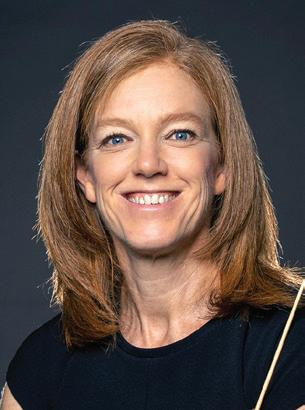 ANN G. SMITH
ANN G. SMITH
This is a personal letter to you, orchestra director, musician, teacher, mentor, and friend.
The headlines and social media posts are inescapable: teacher shortages, school fund ing, teacher certification, curriculum expectations, student mental health, standardized testing, jack hammer parents, and on and on and on. The teach ing profession has never been under this much scru tiny, and teachers are exiting the profession faster than ever. We are asked to do more every day with the same compensation, and our value is constantly being brought into question.
We live in a country where many believe a person’s value is reflected in their monetary compensation. While compensation is important, that is such a limiting perspective. Our value as teachers isn’t confined to our paycheck. Our value comes from our expertise, our identity, and our impact on students. I want you to know that you have value, and you are valued.
You are an expert in your field. Your expertise extends from music and artistry to curriculum development and management. You have spent your lifetime learning all the minute details of your subject. Teaching is an art and a science that requires years of specialized education and much practice. You are well-versed in the musicians and composers who make up western music. You have explored and learned about compos ers and musicians who represent traditions and cultures outside your
October—Renew your membership and register for the convention.
October 6, 6 a.m. CT—TMEA convention housing reservation system opens online.
October 15 —Honor Orchestra Parts B & C and the recording due for HS String.
October 25–26 —HS String Honor Orchestra adjudication.
October 29 —Last day to submit Area audition recordings.
November 1 —TMEA scholarship online application deadline.
November 12–13 —Pre-Area and Area adjudication.
January 19 —TMEA convention early registration deadline.
February 8–11 —TMEA Clinic/Convention in San Antonio.
You make a tremendous impact on students every day! This impact may not be understood for years to come but make no mistake, you are making a difference.
own. Doing this reflects your understand ing that all genres of music are important and should be explored, learned, and per formed. This also reflects your understand ing that students need to see themselves in the music they perform. Your search for musical knowledge and understanding extends beyond your formal education. You spend many hours a week studying scores and researching historical informa tion for the pieces that have been selected for your ensembles. You go to great lengths to teach pedagogy in the best form possible and to create different approaches to find what works best for each student. Educator Melissa Townsend stated this well in an article she wrote on adapting teaching to student needs, “Teachers are educational doctors. We assess, we run tests, we diag nose, we prescribe.” You do this hundreds of times a day and you do it with a high level of precision.
Your value is embedded in your iden tity, and when your identity is scrutinized under a microscope, it’s easy to discount your value. Your purpose as an educator is entrenched in your identity and your identity defines your purpose. With every thing that has been thrown at you over the
past two years, it is understandable that you might question your purpose and your identity, so it’s important to do the work that will strengthen each. This is done by investing in yourself and investing in areas outside of music and education.
As we work to diversify our identity, all parts of our self become stronger and our purpose gains value. Look at advice that is given for investing monetarily in our future. We are told to diversify our investments to strengthen our financial outlook and stabilize our future. Another bit of financial advice often given dur ing a downturn in the economy is to hold on to our investments. Do not react to
a downturn in the market by selling off your investments. If your investments are strong, they will survive the market down turn. Be confident and strong in your iden tity, even through the more difficult times, and when the tough times are over, your identity will be even stronger.
It’s worth repeating—you have value and are valued! As an educator and as a musician you make a tremendous impact on students every day! This impact may not be understood for years to come, but make no mistake, you are making a difference. Stay strong with that knowledge. When that one student stays just a few minutes after class to ask you a simple question
at Samford’s School of the Arts Division of Music
Samford University offers degrees in composition, commercial music, music education, music and worship, instrumental, piano, and voice performance, and piano performance and pedagogy.
Visit our website to learn more about the Division of Music.

and you take time to answer despite your need to prepare for the next class or task, you are making a difference in their life. The acknowledgement you give students as they walk through the halls or through the door to your classroom makes a differ ence. Yours may be the only good morning or how are you doing a student receives in their entire day. As you get entrenched in the daily duties, activities, and rehearsals, you can still take these moments to build relationships with your students.
You also bring a level of excitement to your students. The energy you infuse into each rehearsal and the music you study is infectious. It’s what keeps students coming back and sparks their love of music.
An orchestra director friend shared a story on social media about the importance of our influence. The director had been out to dinner with her family, and after catch ing up with their waiter, who was a former student, the waiter brought their check. My friend noticed their entrée wasn’t on the bill and asked about it. The waiter said, “Orchestra did so much for me, the least I can do is take care of your meal.” This is just one small example, but there are many accounts of former students walk ing around as better adults because of you and your program (be sure to read Robert Floyd’s column on page 8, as he also covers this important topic about understanding our influence).
I want everyone to know the love and support I have for you. You are of infinite value to your school, program, and stu dents. I know this might not be clearly reflected in what is happening outside your classroom, but that doesn’t make you any less valuable. You are an expert in your field. You are a teacher, musician, and music educator, and you are so because you want to change lives through music. You make an immeasurable impact on your students.
I hope you have registered to attend our convention, which will be held in San Antonio, February 8–11. This is going to be a special time of reunion, rejuvenation, and learning, so don’t wait to register to attend! Go to www.tmea.org/register today.
Discounted housing for TMEA mem bers opens on October 6, at 6 a.m. CT. As always, once the official housing system opens, hotels will sell out quickly. Please understand that while TMEA works hard
to secure the best rates for our convention housing, each property limits the number of rooms they allow us to have in our block. You can go to www.tmea.org/housing to learn more and to make a reservation.
Email alert: The week of October 6, TMEA will send a members an email from membership@tmea.org. It will contain the preferred link to use the day we open reservations so you experience the best website responsiveness. As always, before clicking on links in any email, check the full email address to verify its legitimacy. Each year, members and exhibitors report receiving scam and phishing emails that are related to our event.
It is with great pleasure and excitement that I introduce the 2023 TMEA All-State Orchestra Conductors. These three con ductors are incredibly talented and are committed to diverse, engaging, and artis tic programming, which will be reflected in the programming for all three All-State Orchestras. I look forward to sharing information about our All-State Mariachi Conductor in a future issue.
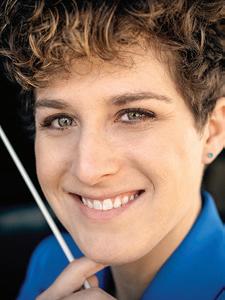
Michelle Merrill has a strong Texas music heri tage. She was born in Dallas and studied conducting with Dr. Paul C. Phillips at Southern Methodist University’s Meadows School of the Arts from which she holds a master’s degree in conducting and a bach elor’s degree in performance.

Since her time at SMU, Merrill has been inspiring audiences throughout the country with her detailed and vibrant per formances. She served four years as the Assistant and then Associate Conductor of the Detroit Symphony. Merrill cur rently serves as the Music Director of the Coastal Symphony of Georgia, where she has inspired the growth and expansion of the orchestra on and off stage.
Some of Merrill’s most recent and upcoming engagements include the National Symphony Orchestra, San Francisco Opera, Dallas Symphony Orchestra, Cincinnati Pops Orchestra, Toledo Symphony Orchestra, and the Round Top Music Festival Institute.
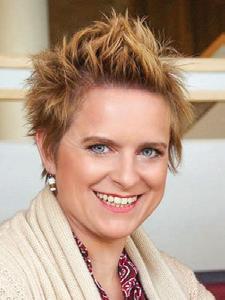
Tamara Dworetz, a native of Atlanta, has established a reputation as a compelling and ener getic musical force on the podium. Her Texas connections include serving as co-music director for the University of Texas University Orchestra and Interim Conductor for the Austin Youth Orchestra. Dworetz was selected as one of 14 candidates for the 2022 La Maestra Conducting Competition and Academy for Women Conductors. She was the only U.S.-born conductor selected and earned a spot as a semifinalist.
Her accolades and recognitions extend across many competitions and institutes throughout the United States. Dworetz has served as Assistant Conductor for the Atlanta Opera and Cover Conductor for the Sarasota Orchestra. In the 2022–2023 season, she will make her debut with the Louisiana Philharmonic Orchestra and will guest conduct the Boston University Chamber Orchestra.
Dworetz’s public school teaching and music-for-all philosophy is the guiding force in her professional endeavors and programming selections.
Jennifer Drake is a highly enthusiastic musi cian, known for her ver satility, humor, energy, and ability to engage with ensembles on all levels. She is not only a conductor but also a violist, teacher, and sought-after teacher clinician. Drake has been an invited conductor for many allstate and honor groups across the United States.
Drake is the Music Director for the Serenata Orchestra and the Boise Philharmonic Youth Orchestra. She has served as the assistant conductor and principal violist for the Fairbanks Summer Arts Festival and has been guest conductor for the Idaho State Civic Symphony, Boise Philharmonic, and Opera Idaho. Drake is also co-artistic director and founder of the Idaho Orchestra Institute. She has enjoyed an international chamber music career, performing in Iceland, Holland, Denmark, Romania, Spain, Italy, Germany, Austria, and Canada.




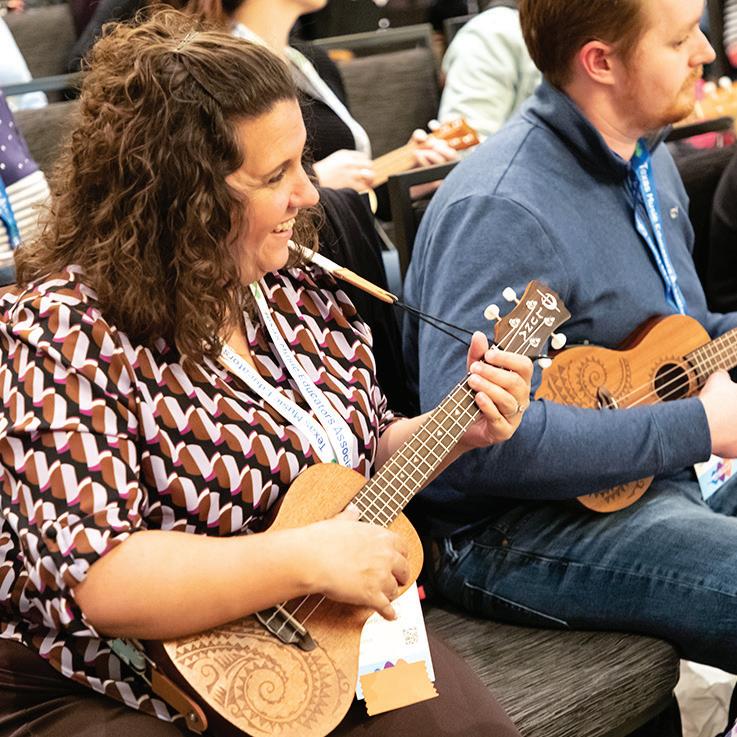


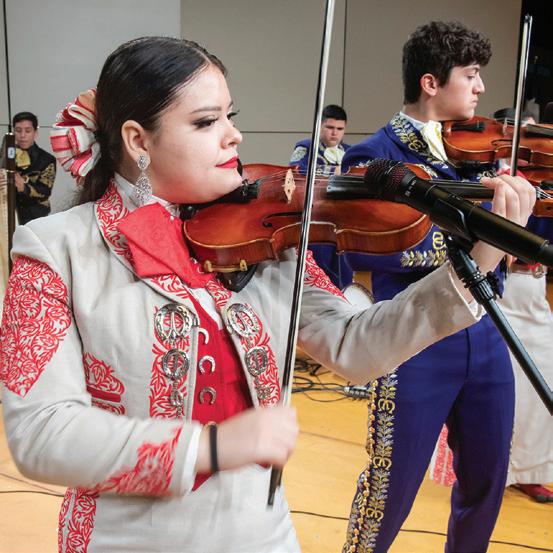
Bowman MS Wind Ensemble Mark Caspersen & Andrew McCraw...........Plano, TX
Chapel Hill JH Honors Band Jaylon Stewart Tyler, TX
Fairview JH Symphonic Band Jeremy Kitchens Alvin, TX
Foster MS 8th Grade Band Jada Alexander Longview, TX
Four Points MS Wind Ensemble Jessica Lee Gonzales Austin, TX
Hodges Bend MS Honors Band Aaron Goldfarb Houston TX Schimelpfenig MS Wind Ensemble Ben Altom Plano, TX
Splendora JHS Wind Ensemble.......................Michael Lehew Splendora, TX
Veterans MS Honors Band...............................Raymond Alaniz Rio Grande City, TX
Adams MS Honor Band Darlene Blose Fulshear, TX
Blalack MS Honors Band.................................Keith Marshall Carrollton, TX
Cockrill MS Honors Band Kyle Wiechmann McKinney, TX
Danville MS Wind Ensemble Kelsey J. Lien New Braunfels, TX
Dowell Wind Ensemble Tiffany Lisko McKinney, TX
Fort Settlement MS Honors Band Theresa Baragas Sugar Land, TX
Highland Park MS Honors Band Loren Taylor....................................................Dallas, TX
Danny Jones MS Honors Band Luzviminda S. Pascasio Mansfield, TX
Keller MS Band David Puckett Keller, TX
Nimitz MS Symphonic Band............................Jordan Freeman Odessa, TX
North Shore MS Wind Ensemble Danny Rubio Houston, TX
Otto MS Wind Ensemble John Vanhook Plano, TX Pearland JH West Honors Band Meredith Bishop Pearland, TX
Red Oak MS Honors Band Megan Czerwieski Red Oak, TX
Rogers MS Symphonic Winds Joshua Ferman Prosper, TX
Thornton MS Honors Band Jason Finnels Missouri City, TX
West Ridge MS Wind Ensemble Alanna Tate Kumme Austin, TX
WoodCreek JH Honors Band Bobby Guess Katy, TX
Aubrey HS Symphonic Band Jason Noyes Aubrey, TX
Krum HS Honor Band Brandon Huff Krum, TX Midlothian Heritage Wind Symphony Rich Bahner Midlothian, TX
Samuel V. Champion HS Wind Ensemble Jason Younts
Grapevine HS Wind Ensemble James Rees
Braswell HS Wind Symphony
Aaron Snipes, III
Aubrey, TX
Conroe HS Wind Ensemble William Skembos Conroe, TX
Winston Churchill HS Wind Ensemble Amanda Stevenson San Antonio, TX
Lakeview Centennial HS Wind Ensemble Jared Hudler Garland, TX
Douglas MacArthur Wind Ensemble Hector Trevino San Antonio, TX Oak Ridge HS Wind Ensemble Jerriald Dillard Conroe, TX
J.J. Pearce HS Wind Ensemble Dimitrios Icossipentarhos Richardson, TX
Rockwall - Heath HS Wind Ensemble Christopher Loyd Heath, TX
Sachse Wind Ensemble Holly C. Taylor Sachse, TX
Westwood HS Wind Ensemble Thomas Turpin Austin, TX Wylie HS Wind Symphony Todd Dixon Wylie, TX
Churchill Fulshear Wind Ensemble Andrew Lee Fulshear, TX
Galena Park HS Wind Ensemble KC Christensen Galena Park, TX
Jack C. Hays Wind Ensemble John Rauschuber Buda, TX
Lake Ridge HS Wind Symphony Brad Bonebrake Mansfield, TX
Pearland JH West Honors Band Meredith Bishop Pearland, TX
Special thanks to adjudicators Anthony Maiello, Fred Allen, Larry Livingston, and Robert Carnochan.
Anthony MS Chamber Orchestra
Joanna Schess Cypress, TX
Boerne, TX
Grapevine, TX
Jack C. Hays Wind Ensemble John Rauschuber Buda, TX
Hendrickson HS Wind Ensemble James Hairston Pflugerville, TX
Rio Grande City HS Symphonic Winds Eric Garza
Rio Grande City, TX
Sherman HS Wind Ensemble Ryan Jenkins Sherman, TX
Timberview HS Wind Symphony Eric M. Mullins Arlington, TX
Wakeland HS Wind Symphony Tanner Smith Frisco, TX
Cinco Ranch JH Symphony Orchestra
Laura Vu & Barbara Jones Katy, TX Curtis MS Chamber Orchestra Amanda Su Allen, TX Ereckson MS Chamber Orchestra Joanna DeVoto & Rachel Boone Allen, TX Garcia MS Chamber Orchestra Frances McLean & Giovanni Fuentes Sugar Land, TX Rushing MS Chamber Orchestra Caitlyn Nguyen Prosper, TX Sartartia MS Honors Orchestra Heather Davis Sugar Land, TX WoodCreek JH Chamber Orchestra Klayton Hoefler Katy, TX
Curtis MS Symphony Orchestra Amanda Su, Amy Gearhart, Craig Adams Allen, TX
Atholton HS String Orchestra
James Woomert Columbia, MD
Emilee Hall-Rocha & Mykel Martin San Angelo, TX Guyer Rhapsody Orchestra Michelle Brians Hanlon Denton, TX
Central HS Chamber Orchestra
Round Rock HS Symphony Orchestra Sandra Vandertulip Round Rock, TX
James E. Taylor HS Chamber Orchestra Clinton Capshaw Katy, TX
L.D. Bell HS Full Symphony Orchestra
Allison King, Suzanne Dell, Christopher Harmon and Jo Ann Antinone Hurst, TX
McKinney HS Symphony Orchestra
Jeff Harvick McKinney, TX McNeil Symphony Orchestra James Caswell Austin, TX
Special thanks to adjudicators Robert Franz and Larry Livingston.
Ford MS Select Treble Choir
Fort Settlement MS Varsity Choir
Tidwell MS Cantare
Susy Gulley Allen, TX
Kirsten Jordon Sugar Land, TX
Evan Lane Roanoke, TX
SGrand Prairie Fine Arts Academy MS Tenor-Bass Singers Joel Duarte Grand Prairie, TX
Tidwell Middle School Forte JV Men’s Choir Evan Lane Roanoke, TX
Grand Prairie Fine Arts Academy Singers
Tomball Memorial HS Chorale
Wylie East HS A Cappella Choir
Granbury HS Varsity Treble Choir
Tomball Memorial HS The Major Chords
Wylie East HS Varsity Treble Choir
Joel Duarte Grand Prairie, TX
Jed Ragsdale Tomball, TX
Nathan Dame Wylie, TX
Kendra Fisher Granbury, TX
Jed Ragsdale Tomball, TX
Ashley Dame Wylie, TX
Lake Belton MS Jazz Band
North Ridge MS Jazz Band
Denton HS Lab Band 1
Jack C. Hays Jazz Ensemble
Jacob Guerrero Temple, TX
Jessica Shadman North Richland Hills, TX
Jesse Woolery Denton, TX
Aaron Venegas Buda, TX
Stephen F. Austin HS Percussion Ensemble
Dickinson HS Percussion Ensemble
McKinney HS Percussion Ensemble
Pearson Ranch MS Percussion Ensemble
Special Thanks to adjudicator She-e Wu.
Andres Aya Sugar Land, TX
Todd Sommer Dickinson, TX
Tyler Nechamkin McKinney, TX
David Eickbusch & Anne Leo Austin, TX
These performances are now a permanent xture in the most comprehensive and prestigious library of its type, and are accessible from anywhere in the world in just a few minutes.
Performances by the National Winners represent the top 25% of the entries, and demonstrate stunning musical achievement and exemplary teaching! In 2022, the project had 376 entries, and has now received entries from 39 states.
View and access the Mark website and catalog at www.markcustom.com
More information is available at www.foundationformusiceducation.org/Mark-of-Excellence
Regardless of your knowledge as a musician, half the bat tle for a teacher is getting students to listen and apply the skills they are taught. By improving student engage ment and individual accountability in your classroom, students can be more self-sufficient and focused. Having a toolbox full of strategies, procedures, and techniques can make your job easier, more effective, and more enjoyable.
One of the key attributes of a successful music educator is a growth mindset. It is important that we ask questions, be lifelong learners, and try new things. After 25 years as a band director, the one thing I know with certainty is that I do not know it all. The best educational strategies are borrowed from others, and most great directors I know are always willing to share.
Visit other rehearsal halls in your area and observe procedures. Watch successful directors who know how to motivate and inspire. Take time to learn the why of a warmup or technique before you decide to implement it; don’t start something just because it seems like everyone else is doing it!
Classroom management, engagement, and attitude are things the director can change quickly with some helpful strategies. I hope the following tools might help you as you consider how to improve engagement and accountability in your program.
Like our state’s weather, the climate in your room can quickly change. Everyone has stormy days (especially as we near a contest), so we must work to keep the mood positive. Greet students with a smile and call them by name. Pass out a blank sheet of paper and ask students to personalize it as a name tag that will help you get to know them better. Do students like to hang out in your room before and after school and play? If that’s not happening, consider a project that will bring students back outside of class. This might inspire others to follow their example.
Culture takes longer to build and change. It has to do with how
your program is perceived. While many of us are guilty about never leaving the rehearsal hall, we need to make an effort to con nect with others at our school. The custodian on your campus is one of the hardest working individuals around, so be sure to value them; get students to demonstrate that by picking up a piece of trash and throwing it away on their way out the door.
In addition, a little give and take with coaches will help your program in the long run. At our campus, we make sure students are never put in the middle. As a result, the majority of the star athletes are also in band.
For more advice from members on how they support students who participate in multiple organizations, go to page 16.
Encourage students to perform for their other academic teach ers before big auditions and find a way to thank those who listen. Social media can also be a great tool for telling the community about the great things happening in your program. Be an asset for your community.
As musicians, we know the importance of details. Extend this to every aspect of your program and inspect daily. I make a point of hearing each student every day during class. This can be as simple as one note down the row (even in a 70-person class, pass ing a concert F should take only three minutes).
How do students enter the room? Do you have a plan for back packs and cases? Do you expect students to warm up on their own? If so, be sure parameters for their warmup are defined. In my classes, only experienced students may warm up alone when they enter the room, and I explain the expectations (because I definitely don’t want to hear a pep band tune the first three minutes of the
period!). Whatever procedure works for you, be consistent and clear in your expectations. Remember that your class is unlike any other in the school, so students will need guidance on what to expect and how to behave.
For beginners, consider their class a marathon—it’s not a sprint! The first year, every detail should be explained, down to what side of the chair to set their case. How are instruments held when at ready position? What are the proper fingerings and playing posi tions? How do we use the stand? Remember that all fundamentals should be consistent across classes.
Better engagement in your classroom will make what you are already doing more effective. At the end of your class, students should be mentally exhausted because you kept them focused the entire time. And while it is important to establish predictable rou tines, utilizing a variety of engagement techniques can make class more enjoyable for everyone.
Movement: Include movement every day. This could take the form of students standing up to answer a question, giving a thumbs up or down, or pointing at the music/mistake/me. It doesn’t take much time to ask students to stand if they have a pencil or to answer a question. Your students likely spend too much time sit ting during the rest of their day, so make your class different! Daily movement applies to the teacher, too. Be sure to get off the podium and walk around the class daily. Proximity can eliminate a lot of behavior issues and it increases your students’ focus on what you are saying.
Effective Questioning: When you ask a question, do the same students usually respond? Make your class more interactive by utilizing varied techniques when you ask questions:
Cold calling is a great way to engage more students in the think ing process. If this is a new technique for your students, preface the question by telling them you don’t want them to raise their hands. After a while, they will understand that when you ask a question, they need to have an answer ready because you might call directly on them. When you begin this technique, first call on students you believe will know the answer; this will encourage other students to be ready. Nobody wants to be the one to get it wrong when every one else has been paying attention.
Increased wait time is another effective technique. When you ask a question, do you give students time to think, or do you call on the student who raises their hand first? I often ask a question, wait, and then say that I don’t see the student I wanted to pick ready to answer. (This is when someone usually asks for the question to be repeated!) The goal is not to get the answer right first, but to get everyone thinking.
Follow-up questions also increase engagement. Asking “How did you know that?” or “What does that mean to you?” can fill in the gaps for other students. This encourages students to dig deeper.
Questions that require higher-level thinking will improve your rehearsals. Instead of telling students they did not perform the written dynamics, stop and give them the chance to figure out what was missing. I often encourage students to be the director and tell me why I stopped. By telling me what is wrong, it encourages them to listen.
Repeat What I Said, Summarize or Finish the Sentence: When you review a concept or say something important, choose a stu dent (or two) to repeat back exactly what was said. For a higher
level of rigor, ask a student to summarize. If there is a concept everyone should know, reinforce it by asking students to finish the sentence. When I say, “Notes followed by a rest,” my students can respond with, “touch the rest.” Any increased interaction will improve your rehearsals. Nobody likes to sit and listen to a lecture.
Pair Share/Peer Tutor: In pair share, students work in pairs to respond to a question or discuss a topic. You will need to convey rules about when each in the pair talks and when they listen. This will keep students focused and create better listeners. It is best to give students clear objectives about things to check. Remind students that they are responsible for making sure their partner is also correct—not just themselves. Turning to a partner to pair share can take just a few minutes of class.
Peer tutoring is very effective when the teacher picks the part ners. Strategically pairing students of varied skill level can help improve everyone’s capacity. By allowing students to explain things to each other, concepts are reinforced for strong learners, and hearing things a different way can help struggling learners. Walk around and inspect this process while it is happening.
Our ensembles will likely be the largest teams our students will ever be on, and while every student won’t become an all-state musician, they can all develop a love of music. We must create an environment where everyone experiences success and where we celebrate each student’s growth. By creating a positive and engaging classroom with high expectations, we can teach every student what’s most important: gaining a lifelong love of music and becoming an advocate for the arts.
0
Christine Cumberledge is Director of Bands at Central JH in Hurst-Euless-Bedford ISD.
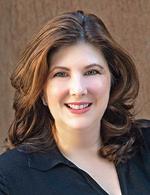
SouthweStern MuSician provides a venue for sharing your ideas with your colleagues around the state.
Our aim is to provide readers information that can be immediately applied in the classroom. If you have strategies to share, read about our submission guidelines online:
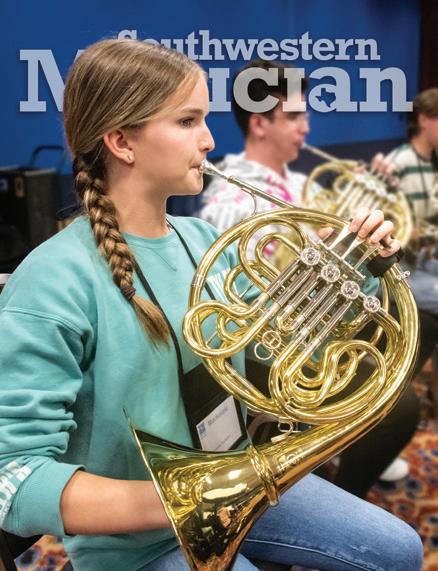
While it is important to establish predictable routines, utilizing a variety of engagement techniques can make class more enjoyable for everyone.
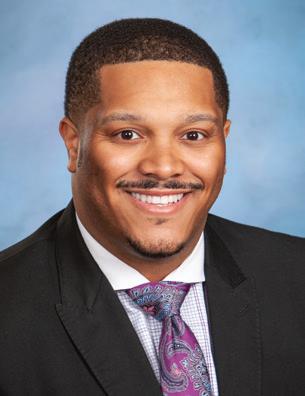
If each year we successfully recruit many students but the majority do not continue, what value did our efforts truly have toward building our program?
Ann Buchanan 1936–2022
If you were carrying a bucket of water that had a hole at the bottom, would you continue to add more and more water or would you make sure you had properly patched the hole first? In your choir program, do you try to add more and more students, or do you first try to retain the core of your current students?
It always used to come as a surprise when our counselors asked for our rosters in February. Amid preparing for the TMEA convention and gearing up for UIL and other end-of-year events, it felt rushed. If you haven’t already, I suggest you begin conversations with your counselors and develop a four-year plan so that, regardless of endorsement or additional CTE courses, students can still participate in your program.
While recruitment is a necessary part of any successful program, it is not the first step. Start now by creating a retention strategy before you focus all your energy on recruitment. Of the first-year students in your program, how many continue?
If each year we successfully recruit many students but the majority do not continue, what value did our efforts truly have toward building our program? In this situation, we end up starting from scratch year after year, rather than building a self-generating program that produces con sistent returns on its own. I’ve included a couple of starting points to help us make retention our top priority, with dividends to follow.
Our best recruits come by referral from vested students. A continu ing student who brings in a new student the following year is the most
October—Renew your membership and register for the convention.
October 6, 6 a.m. CT—TMEA convention housing reservation system opens online.
November 1 —TMEA scholarship online application deadline.
January 7—Area Vocal and Band auditions.
January 19 —TMEA convention early registration deadline.
February 8–11 —TMEA Clinic/Convention in San Antonio.
powerful example of success. This means we have students who are vested in the suc cess of our program and want their friends to appreciate our choir culture.
Returning students set the tone for all new members. When most of our students continue, our core will remain strong from year to year. Additional students (recruits) will join a class filled with experienced singers they will follow and learn from. Continuing students will lead the way in demonstrating to those new recruits proper rehearsal etiquette, focus, sight reading skills, confidence, tone, blend, and more. If our daily focus in class isn’t led by continuing members, new members will take the reins in dictating appropriate (or inappropriate) behavior and expectations, and that can make for one tough year.
I believe that every student who signs up to be part of a program is one worth having for the entirety of their high school career. We must focus our energy on cre ating a successful plan to retain these stu dents prior to employing our recruitment strategy.
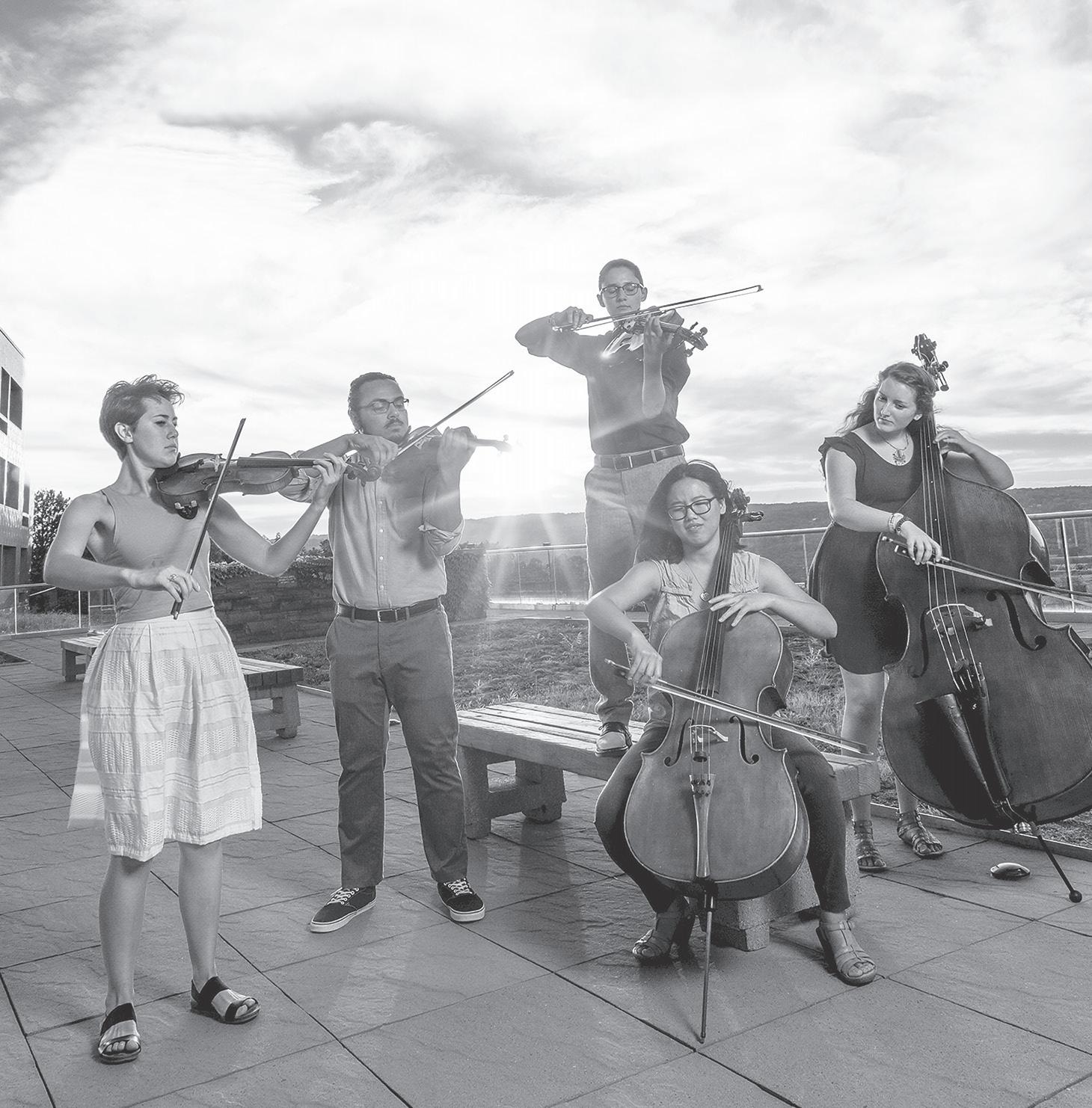
Just as we focus on ways to keep our students in our programs, attending this convention is an important part of how we stay in our profession! We access incred ible professional development clinics, get inspired by performances, and have amaz ing opportunities to get to know others and develop a network of support we all need after we go back home! If you haven’t registered yet, be sure to do that now at www.tmea.org/register.
TMEA works to secure affordable nightly hotel rates near the convention cen ter. It’s important, however, to understand that each hotel we negotiate with limits the number of rooms they allow in TMEA’s block. Our hotel reservation system opens Thursday, October 6, at 6 a.m. CT, and I encourage you to reserve early to ensure you have a place to stay for our amaz ing annual event. The week of October 6, TMEA will email members a link to use for the day we open to get the best reserva tion website performance. After that, you can always visit www.tmea.org/housing for information and access to the system.
There are many opportunities for you to serve and your volunteerism ensures our 2023 event is the incredible success we all anticipate! To register and indicate your areas of interest and availability, go to www.tmea.org/vocalvolunteer.
I am excited to introduce our 2023 All-State Conductors. The experiences they will share with our students will be life-changing! As you read about them, remember that during our convention, you can attend rehearsals and learn from them in action. If you haven’t already reg istered for the convention, do it today! Go to www.tmea.org/register.
Jennifer Sengin is the Associate Director of Choral Activities at Georgia State University, where she conducts the Treble Choir and Choral Union, teaches graduate choral literature, co-teaches a
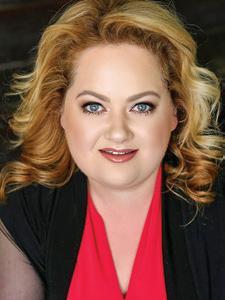
graduate conducting seminar, teaches a combined graduate and undergraduate conducting course, and supervises student teachers.
Under her direction, the Women’s Chorus (now Treble Choir) won first place in The American Prize in Choral Performance and Sengin received 2nd place in conducting. The Treble Choir has been invited to perform at the Georgia Music Educators Association Conference in January 2023.
An active guest conductor, clinician, adjudicator, and presenter, Sengin has con ducted honor choirs throughout the coun try and presents on recruiting, rehearsal strategies, movement, and building com munity in the choral ensemble. She was recently selected as a Conducting Fellow with ACDA’s International Conducting Exchange Program and will travel to Germany in 2023.
Sengin currently serves on the National Board of the National Collegiate Choral Organization, the R&R Chair for Youth and Student Activities on the GA-ACDA Board, and as Faculty/Administrator of the Choral Music Experience for Choral Teacher Education program.
Eugene Rogers is rec ognized as a leading con ductor and pedagogue throughout the United States and abroad. In addition to being the founding direc tor of EXIGENCE, Rogers was recently named as the fifth Artistic Director of The Washington Chorus (Washington, D.C.). Rogers is also Director of Choirs and an Associate Professor of Conducting at the
University of Michigan, where he leads the graduate choral conducting program, conducts the chamber choir, and admin isters the program of over eight choral ensembles.
In 2016, Rogers’ passion for issues of social justice and music was featured in the documentary Love, Life & Loss, which highlights Joel Thompson’s powerful Seven Last Words of the Unarmed. In 2013, he co-managed the production of the CD Ye Shall Have a Song with the Michigan, Yale, and Harvard Glee Clubs, celebrating America’s three oldest collegiate choirs.
In 2015, Mark Foster Publishing began the Eugene Rogers Choral Series, featur ing emerging composers who specialize in contemporary classical and folk music tra ditions, and the EXIGENCE Choral Series in 2018 which features folk and contempo rary works by Black and Latinx composers.
Rogers holds a bachelor’s degree from the University of Illinois at Urbana Champaign as well as master’s and doc toral degrees in choral conducting from University of Michigan.
Jeffery Redding, Small School Mixed Choir
Jeffery Redding, the 2019 Grammy Music Educator Award recipient, is the Director of Choral Activities at the University of Central Florida (UCF). He has led choirs in performances at ACDA national, regional, and state conventions and his choirs have earned first place awards at Heritage Festivals of Gold in California, Chicago, New York, and at the Festival of Spirituals in Washington D.C. While participating in the International Music Festival in Verona, Italy, his chorus from


West Orange HS received the Gold Award for best choir, with Redding honored as top director.
Previously Director of Choral Activities at West Orange HS in Winter Garden, Florida, and West Virginia University, Redding has been featured as guest con ductor at Carnegie Hall, Alice Tully Hall, Kennedy Center, and Orchestra Hall on numerous occasions.
Redding holds a PhD in choral con ducting/music education and a master of music education, each from Florida State University, and a BS in music education from Florida A&M University.

He is a member of ACDA, NAfME, FVA, NATS, and Chorus America and has served his profession in numerous capacities.
Julie Yu-Oppenheim, Mixed ChoirJulie Yu-Oppenheim is Professor of Music and Co-director of Choral Studies at Kansas State University, where she over sees and conducts undergraduate cho ral ensembles, choral music education courses, and the master of music choral summer and residency programs.

She holds a bachelor’s degree in music education from the University of Central Oklahoma, master’s degree in choral con ducting from Oklahoma State University, and doctoral degree in choral conducting from the University of North Texas. Before joining the Kansas State faculty, she taught at Norman North HS in Oklahoma and San José State University.
She has given presentations and con ducted for state and regional confer ences of the American Choral Directors Association, National Association for Music Education, and the European Music Educators Association Conferences. She is a Past-President of the Southwestern Region of the American Choral Directors Association and served as an International Conducting Exchange Fellow to Kenya in 2019. In addition to teaching, her favorite area of research and performance involves working as a guest clinician/conductor for various honor choirs and professional organizations.
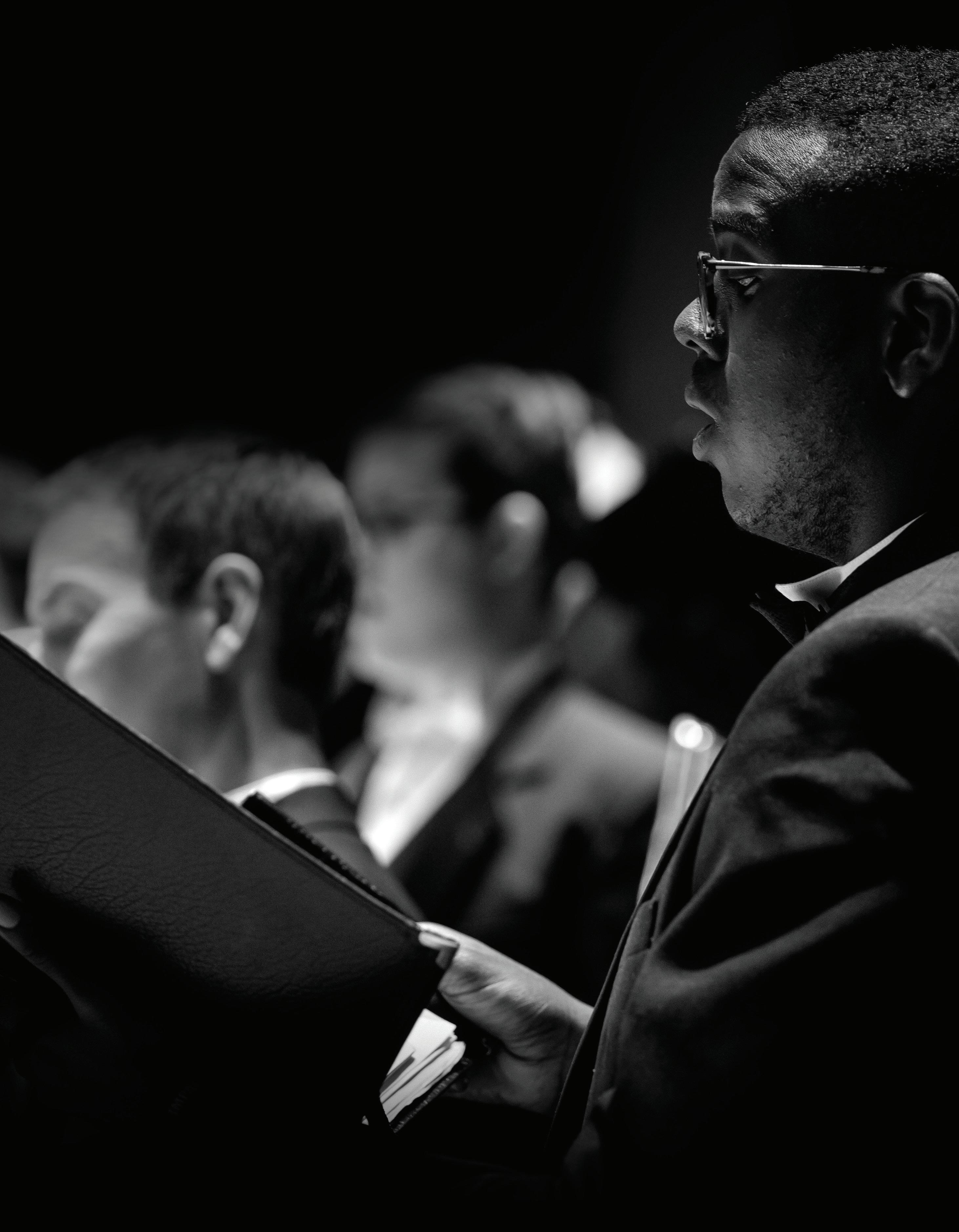
Innumerable volumes have been written about student motiva tion, about ways teachers might kindle a spark in students and keep that flame alive. More recently, these conversations have focused on how teachers support the whole learner—not just the students’ desire to practice or their love of music, but all their learn ing, in and out of school, in ways that will last throughout their lives.
The August 2019 issue of Southwestern Musician was rich with commentary about promoting a positive, uplifting environ ment in music classes and studios. The students-first focus was evident in this prepandemic issue, including celebrating how the power of music learning has a lasting impact on students’ lives. Authors wrote about positive classroom management, teachers who care, creating a sense of belonging and community, and pro viding a space for students to feel at home. A common theme was helping students—through music—have lifelong success, no mat ter their eventual career path.
In just three years since this issue was published, everything we do as music educators—including using music to nurture imme diate well-being as well as lifelong success—has gone into hyper drive. The world is rapidly changing; students and teachers have very different needs now than they did just a few years ago. Music educators must be mindful of the needs and interests of the newest generation of musicians, while continuing to refine and expand upon best practices from centuries of pedagogical traditions. We must remain on the cusp of technological and musical innova tions, drawing upon both past and future to forge exciting new inroads and unforeseen possibilities for music learning and teach ing. It is time to care even more deeply, while also reconsidering what it means to care about, for, and with students.
I have never met a person—teacher or otherwise—who did not consider the act of caring as fundamental to good teaching. Yet definitions and interpretations of care are as numerous and diverse as are teachers themselves; every person manifests acts of care in unique and individual ways. What I offer here are a few ideas about what it might mean to show care for, about, and with music students in this complex, ever-changing world.

We might start by considering what healthy and helpful care might look like in music classes. There is a fine balance for music educators between commendable commitment to our profession and students, versus over-caring to the point of exhaustion and burnout. Part of discerning healthy and helpful forms of care is learning how to use our physical and emotional resources in ways that are most effective.
Music educators can attune to students’ needs and interests in ways that evoke pinnacle musical experiences. This care and compassion for students manifests as a shared passion rather than pity. Compassionate music teaching should not be confused with weakness or lower expectations. Rather, this approach involves learning to understand students authentically, and finding ways to work together to create musical experiences that surpass imagina tion. In compassionate music teaching, teachers and students are both recognized for their unique “superpower” contributions, but no one needs to—nor should—play the role of hero. The following excerpts on this topic are from my book Compassionate Music Teaching 1 :
The ‘hero’ teacher narrative is one that we have come to take for granted, often without questioning what it truly means for us or for the students we serve. Although our egos might salivate at the idea of playing Superman or Wonder Woman in the classroom, such an approach to compassion demonstrates an inherent and ironic problem with power: Not only are stu dents seen as inferior and helpless, but teachers are, in a sense, expected to act the role of benefactor, generously teaching out of the goodness of their hearts without adequate compensation or personal respect.
[If] teachers are placed in a superior position to students, they are simultaneously charged with full responsibility for any and all learning, thereby potentially underestimating the wisdom and contribution of students in the learning process . . . In a more egalitarian view of compassion in education, teacher
and student have different roles to play . . . but neither role is viewed as superior or inferior to the other.
I define compassionate music teaching (CMT) as shared human experience between equals, where each person in the teaching–learning relationship brings their unique strengths and learns from one another.
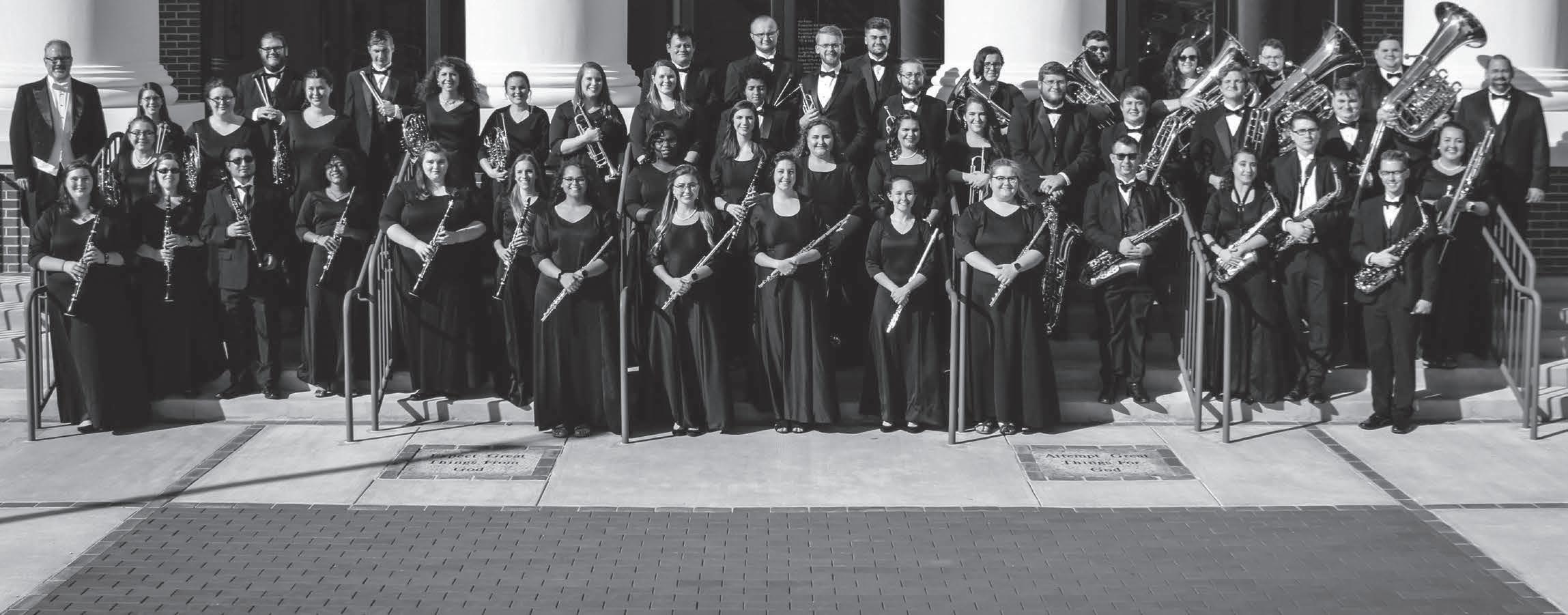
In the CMT framework, music teachers not only care about music and about students, but we also care for students and our selves in healthy and life-affirming ways. Additionally, compas sionate music teaching involves caring with students as music teachers become co-learners along with our students and honor their unique strengths and musical contributions—thereby invit ing students to offer their whole selves to the music-making expe rience. Compassionate music teaching involves:
• fostering trusting relationships;
• exercising mature empathy;
• practicing patience through curiosity and long-term goal-setting;
• creating spaces and places of inclusion;
• building community and a culture of excellence, health, and wellness; and

• forging authentic musical connections.
The CMT qualities of trust, empathy, and patience involve teach ers taking time to foster relationships with students. By so doing,
we can better understand students’ needs and interests and set shared music learning goals that can be continually negotiated and refined together. At first glance it may seem too time-consuming for already busy teachers to build relationships, ask questions, and allow students room to offer their ideas for problem-solving. Yet research tells us that students who have ownership in the learn ing process are far more motivated and engaged, both in the short term as well as throughout their lives. With engaged students, our instructional time becomes more efficient, and we spend less time in redirection.
“Kids these days” are truly different from those of prior genera tions, and it is important to recognize what makes them unique. Although youth connect virtually with people across the world, they ache for authentic connections and tangible relationships. They are also more attuned to global concerns and interested in collective achievements2—meaning they are less likely to be motivated by individualistic or competitive approaches that mark much of our music education history.
Fear-based approaches are out of the question with this gen eration, particularly as students wrestle with a variety of global and individual traumas that are already impacting their ability to learn. It is critical to get to know these students’ diverse and unique identities, needs, and interests, and be willing to replace one-size-fits-all teaching methods with something that is more relevant and meaningful to each learner and each class.

As current students are completely enchanted by Encanto songs, we might remember the lesson of Bruno: It is when we don’t talk about the things that scare us that we get into trouble. Topics such as anxiety and mental health have been treated as taboo in survival-of-the-fittest cultures, including the music performance world.3 It is beyond time to talk openly about mental health so students can learn how to manage their complex feelings and make choices that lead to better and longer-lasting self-care. Music teachers are not therapists, however, and it is impor tant to maintain professional and personal boundaries for the sake of our own wellbeing. We need to model self-care for our students while offering them appropriate resources so they can learn how to care for themselves.
A community of caring necessitates a community of sharing—including a genu ine desire to learn from and support one another. Not only do music teachers have exceptional opportunities to learn along
side their students in our ever-changing world, but it is also critical for us to reach out to other music teachers and share our ideas as well as our vulnerabilities. We all thrive when we work with a spirit of gen erosity and creativity, sharing a common goal of inspiring students with a love of music-making.
Finally, we need to grant ourselves per mission to make mistakes, and we need to recognize the power in modeling for our students how to work through errors and continually improve. As we open ourselves up to learning in every moment, we show our students that it is also okay for them to fail and try again. We can model effec tive improvisation not only in musical cre ativity, but also as a means of navigating uncharted territory in difficult times.
As students see us take risks—including in our attempts to truly understand them, their diverse backgrounds, interests, and needs—they will more likely open up to us, take musical risks, and work with us to create meaningful and relevant learning experiences. In a space where everyone is trying and learning together, it is possible that the work of motivation will take care of itself. 0
Karin S. Hendricks is Chair of Music Education at Boston University and PresidentElect of the American String Teachers Association. Hendricks is a 2023 TMEA College Division Featured Clinician.
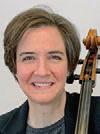
For more extensive information on the topics covered here, read Hendricks’s book Compassionate Music Teaching.
1. Karin S. Hendricks, Compassionate Music Teaching (Rowman & Littlefield, 2018).
2. Karin S. Hendricks, “Contexts and Conceptualizations of Care in Music Education,” In The Oxford Handbook of Care in Music Education, ed. Karin S. Hendricks (Oxford University Press, in press).
3. Casey McGrath, Karin S. Hendricks, & Tawnya D. Smith, Performance Anxiety Strategies: A Musician’s Guide to Managing Stage Fright (Rowman & Littlefield, 2017).
 KATHERINE JOHNS
KATHERINE JOHNS
Singing games used to be a brain break—a fun reward in music class. They have now become a necessary component in our students’ development.
When I began teaching elementary music in Floresville 24 years ago, I taught at the third–fifth-grade cam pus. There was no music teacher for the lower campus, so I taught beginning music con cepts to our third–fifth graders. Singing games were so fun back then—they were easy to teach and in high demand.
I was so excited when it was announced that a new campus would be built, and my campus would transform to serve preK–fifth grade. I imagined playing age-appropriate singing games with the younger students—the way they were intended.
I will never forget that first class when I thought I would easily teach these five-year-olds how to play a duck-duck-goose-like singing game. Even the first step of getting them to form a circle was a challenge. Then I proceeded to demonstrate how to play the game. I sang the song as I walked around the circle. I dropped an object behind a student and told them to chase me. Nothing happened. I picked up the object and handed it to the child and asked him to please chase me. Nothing happened. I helped the student stand up and mimicked running slowly to encourage wanting to be chased. Success! I sat down where the student had started and said, “Okay, now it’s your turn.” Again, nothing. So, I got up and guided the student around the circle as I sang the song. When the song was over, we stopped, and I told the student to drop the object and run. This time he did run—all around the room. As I guided this student back to the circle, another child got up and started running around the room. Eventually, I gave up for that day.
The next day, I figured out a better way to get that group to form a circle in less time. I anticipated they wouldn’t know how to chase, so I took more time explaining. I gave my example and helped the first
check
October—Renew your membership and register for the convention.
October 6, 6 a.m. CT—TMEA convention housing reservation system opens online.
November 1 —TMEA scholarship online application deadline.
January 19 —TMEA convention early registration deadline.
February 8–11 —TMEA Clinic/Convention in San Antonio.







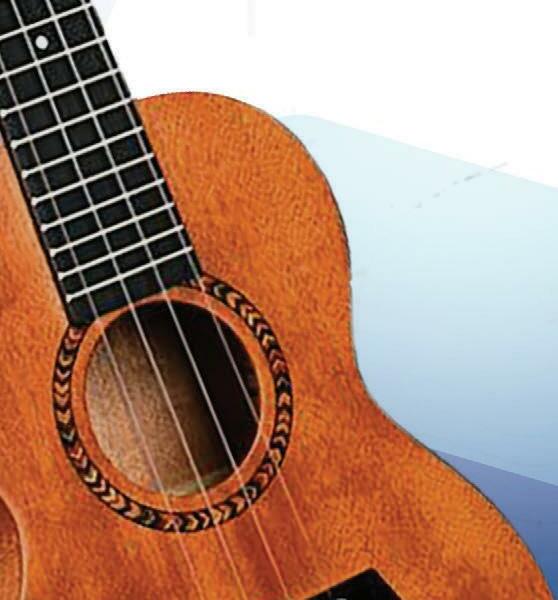









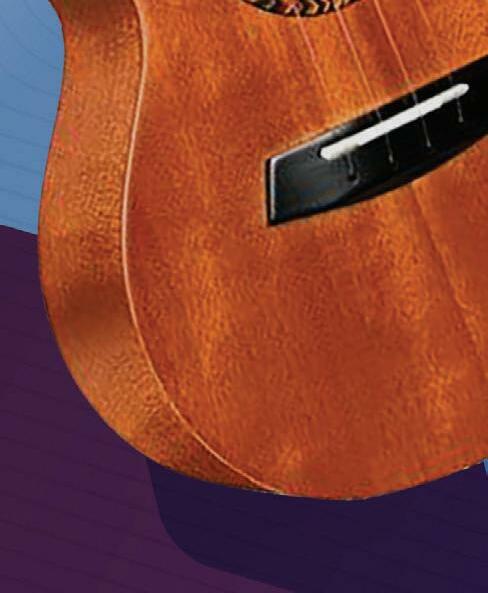









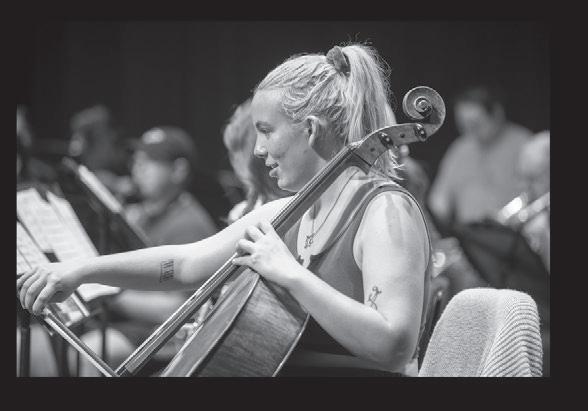
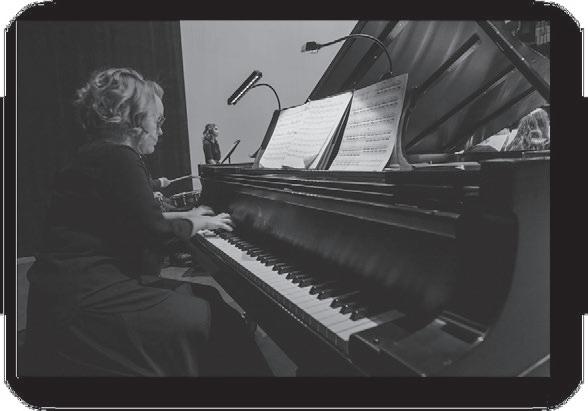



student around the circle. He stopped and dropped the object, and he ran. I helped the next student up, and sent them after the first. And they were both running around the circle—around, and around, and around, not stopping at their spots! So, I stood at the vacated spot and put my hands out to stop the student at the correct place. Then there were others who stopped at their original spots, and others still who ran right through the middle of the circle! It was comical and exhausting.
I share this story because after having taught this singing game to kindergart ners for so many years, I feel like a pro. It’s even old hat. Okay—you might think that’s true, but honestly, it’s not. Every year brings new challenges. I don’t know if it is due to the pandemic or the increased use of technology, but children are arriving to school not knowing how to play. We have to teach them how to play running games, sing while jumping rope, chant while clap ping hands with a partner. Our role as elementary music teacher has gone beyond just reading and writing on the staff. Not only have they missed out on the joy games provide, but they also lack the motor skills that are developed through game play.
Singing games used to be a brain break—a fun reward in music class. They have now become a necessary component in our students’ development. I hope that no matter how challenging it becomes, we elementary music educators will continue to teach singing games to our students. If you need ideas for games and how to intro duce them, come to the TMEA convention in February! There are plenty of clinics on singing games. I hope to see you there!
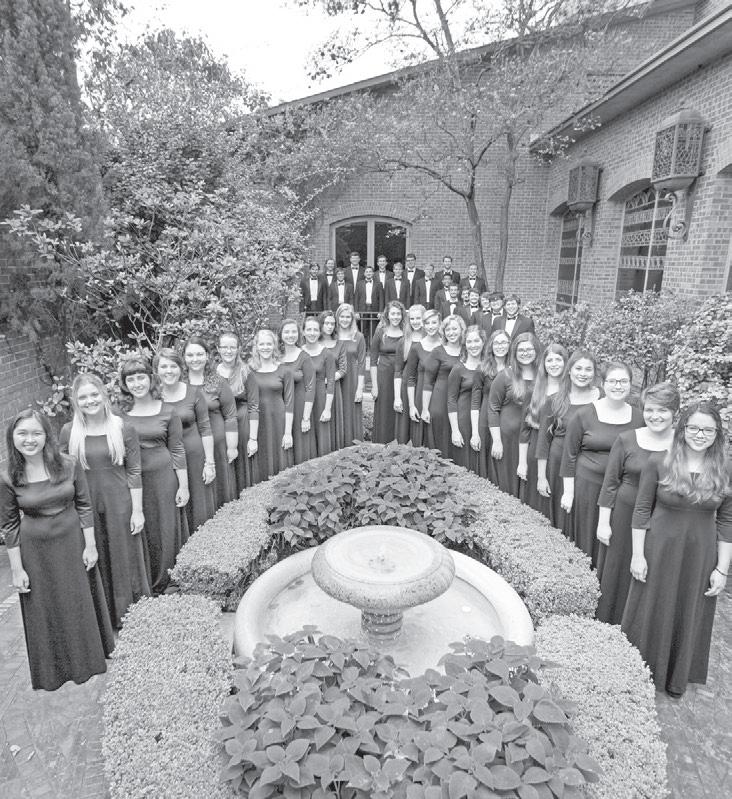
I hope you have renewed your mem bership for TMEA and taken advantage of purchasing the low-cost liability insur ance coverage. Also, be sure to register to attend our incredible convention held in San Antonio on February 8–11. Currently, we are working on the schedule of events, and we need your help.
We need members to volunteer to be presiders for the clinics. If you are inter ested in presiding but are nervous about what is involved, have no fear. One of our Elementary Region Chairs will be creating a how-to video to help answer your ques tions. Maybe you have a heart and passion for children’s choir and ensembles. We are
also looking for Invited Ensemble Guides for Thursday or Friday to help our groups navigate to their assigned rooms in the convention center. If you are interested in either of these opportunities, please go to www.tmea.org/elementaryvolunteer and sign up. Thank you in advance for helping make our next convention the best yet!
Discounted housing for TMEA mem bers opens on October 6, at 6 a.m. CT. Please understand that while TMEA works hard to secure the best rates for our con vention housing, each property limits the number of rooms they allow us to have in our block. You can go to www.tmea.org/ housing to learn more.
Email alert: During the week of October 6, TMEA will send members an email from membership@tmea.org with the preferred link to use the day we open reservations so you experience the best possible online response. As always, before clicking on any email links, check the full email address to verify legitimacy. Each year, members and exhibitors report receiving scam and phishing emails that are related to our event. 0


As music educators, we take into consideration many factors when choosing musical selections for our stu dents to perform. We often examine instrumentation or voice parts, grade level, length, genre, and/or con tent of a new selection. We consider our musicians’ ranges, the ensemble’s strengths and limitations, as well as likability—both by our students’ and ourselves, as teacher, conductor, and adjudicator. Hopefully, we also give careful consideration to cultural diversity and the varying composers we place in front of our students (for more on this topic, read the In Tune Monthly November 2019 arti cle, “Mirror, Mirror on the Wall: Am I Providing Opportunities Reflecting All?”). However, once the music is selected, do we focus on how we will introduce the new selection to our students to enhance their compre hension, interest, and abilities? Or do we simply distribute the music and proceed directly to sightreading with little, if any, background information or explanation?
Scan this code or go to www.tmea.org/mirror to read Schwartz Reichl’s article from the November 2019 In Tune Monthly
There is much that can be done to introduce a new piece of music to stu dents (in both virtual and face-to-face settings), starting with sharing your rationale, and the research you did before making your selection. Share with students the meaning of the title. What can be taught about the composer? It’s always fun to hear about the events that were happening in the world when the piece was composed, or how the piece may represent that time period. Sharing program
notes, or gathering enough information to write your own, will add great color and provide important insights into the selection’s genesis. Then, explaining how learning the piece is intended to contribute to your students’ growth should complete their under standing of its selection.
Consider using one, some, or all of the following methods to introduce a musical selection to your students:
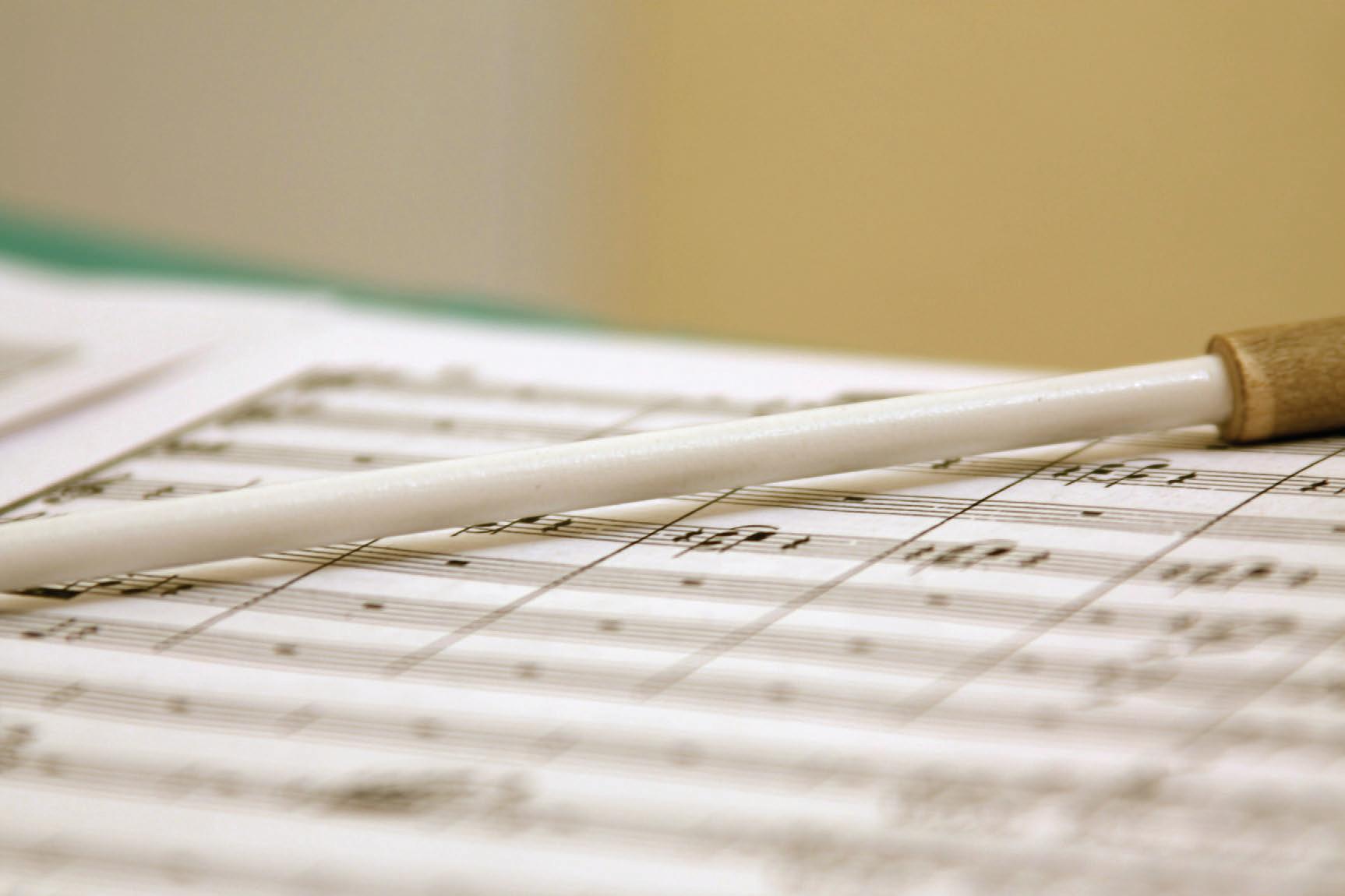
Title: Accurately pronounce the full title of the selection for your students. Encourage them to precisely repeat the title back to you. If the title contains an uncommon word, define it, and use it in another context. If the title is of a different language, be certain to decipher its English meaning. Based on the title of the piece, ask the students to anticipate what the piece might represent or sound like even before rehearsing it.
Composer: Accurately pronounce the composer’s full name. Show a photograph of the composer. Share the composer’s biog raphy, highlighting age, gender, race, location, education, accom plishments, and more. Consider playing a video of the composer (if available) introducing the selection or performing or conduct ing the piece. Ask the students to recall what other pieces they may have performed by the same composer. Inquire what they liked or learned when studying the previous pieces or what motifs or tendencies for which the composer is best known.
A creative way to introduce a selection is to invite a living com poser to visit your music classroom physically or virtually through a FaceTime, Skype, or Zoom session. While recently serving as a guest clinician for the South Dakota Bandmasters Association Conference, I was fortunate to attend the performance of the South Dakota State University Wind Symphony under the direction of
Douglas R. Boyer Director, School of Music and Director of Choral Activities dboyer@tlu.edu 830-372-6869 or 800-771-8521
Eric Daub
Director of Piano Studies edaub@tlu.edu

Liliana Guerrero Director of Vocal Studies lguerrero@tlu.edu
Richard Herrera Interim Director of Bands riherrera@tlu.edu
Eliza Jeffords Director of Strings ejeffords@tlu.edu
FACULTY
Adam Bedell Instructor, Percussion
Carol Brittin Chambers Composer in Residence & Composition
William Hayter Asst. Professor, Clarinet & Music Education
Sean Holmes Asst. Professor, Horn & Music History
Hilary Janysek Asst. Professor, Flute & Music History
Elizabeth Lee Asst. Professor, Cello
Ingram Lee, IV Instructor, Trombone & Euphonium
Deborah Mayes
Choral Accompanist
Scott McDonald Instructor, Saxophone, Jazz Band & Music Education
Carla McElhaney Asst. Professor, General Music
David Milburn Instructor, Double Bass
Angela Moretti Instructor, Bassoon
Nicole Narboni Asst. Professor, Piano Daniel Orban Instructor, Trumpet
Sung-Eun Park
Asst. Professor, Collaborative Pianist
Keith Robinson Instructor, Tuba & Music Education
Jill Rodriguez Instructor, General Music
Eric Siu
Asst. Professor, Violin Yu-Hsin Teng Asst. Professor, Collaborative Pianist
Shareen Vader Instructor, Piano & Music Education
Mika Valenzuela Instructor, Oboe
OF MUSIC
ALL-LEVEL MUSIC EDUCATION BACHELOR OF MUSIC IN PERFORMANCE BACHELOR OF ARTS IN

Michael Keplinger Instructor, Guitar
Yvonne Vasquez Instructor, Mariachi
Dr. Jacob Wallace. To offer a unique intro duction to the audience, Wallace contacted the composers of the performed selections and asked them if they would be willing to briefly record themselves introducing their composition. He showed the video clips to the audience via a large projection screen prior to the performance of each selection. The audience was able to make a human connection to the music before it was performed. Students may also find this connection inspirational before learning a new piece of music.
Historical Information: In addition to discussing what was occurring in history either during the time the piece was writ ten or the time period the piece depicts, share other examples of music composed during this period. Show photographs or videos of landscapes, towns, events, and people. Dressing up in character is always a crowd pleaser!
Program Note: Composers often pro vide a program note for each of their selec



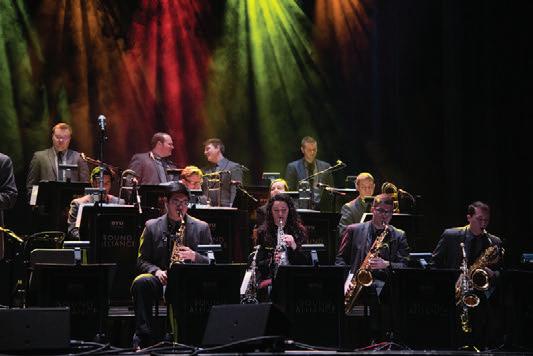


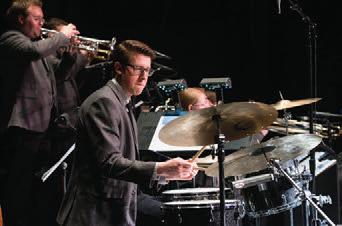
conductor and musician interpretation. If students know why a piece was written, for whom it was commissioned or com posed, and the circumstances surrounding its creation, then it is more likely that they will perform with emotion and empathy.
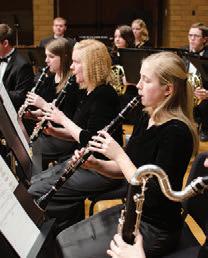

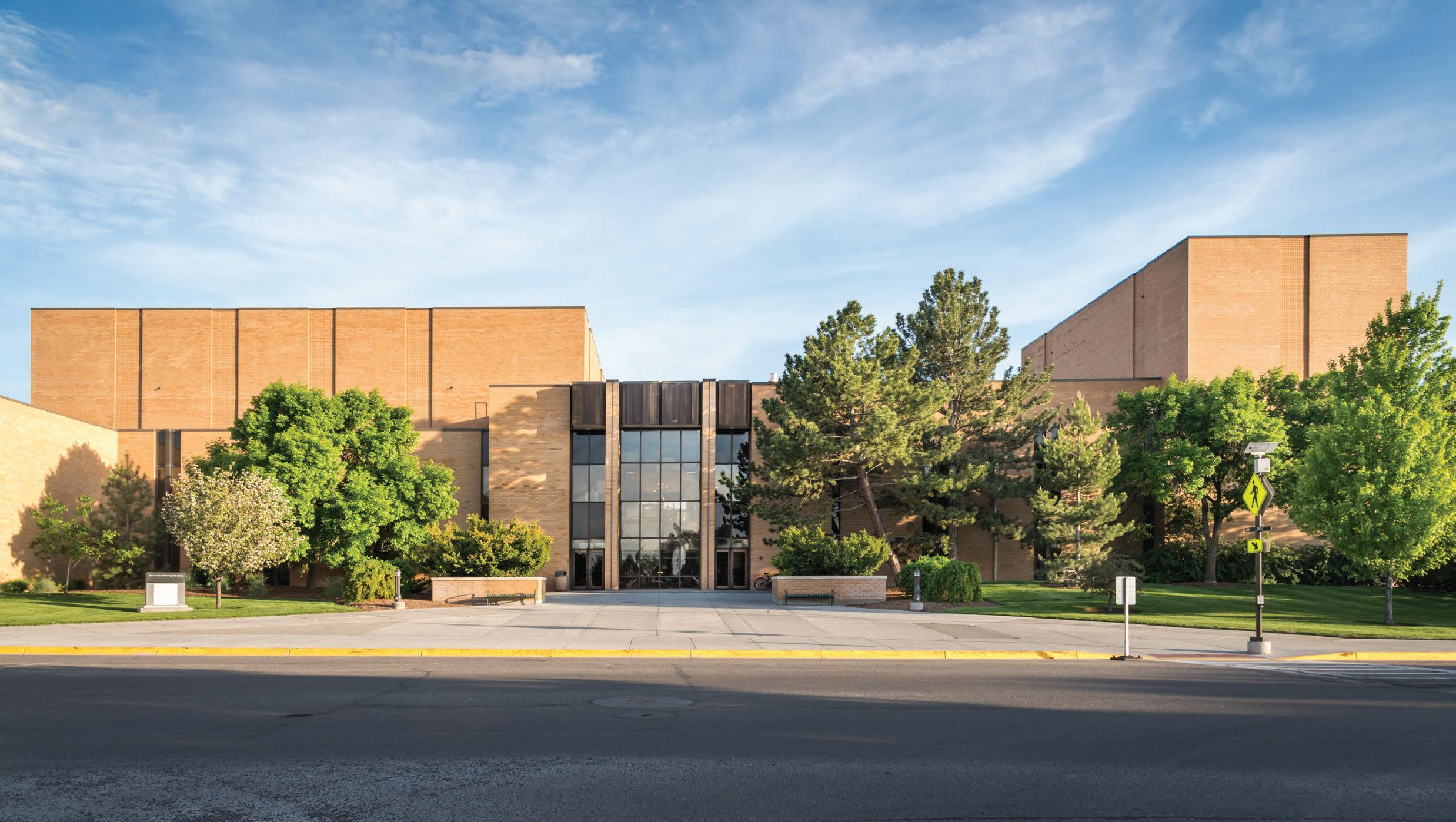
Reason for the Selection: Consider sharing with your students why you chose the particular piece of music to perform. Perhaps you know the composer or can relate how the piece is meaningful or rep resents something to you. Might it be used to honor a person, or an upcoming holiday, season, event, or accomplishment?
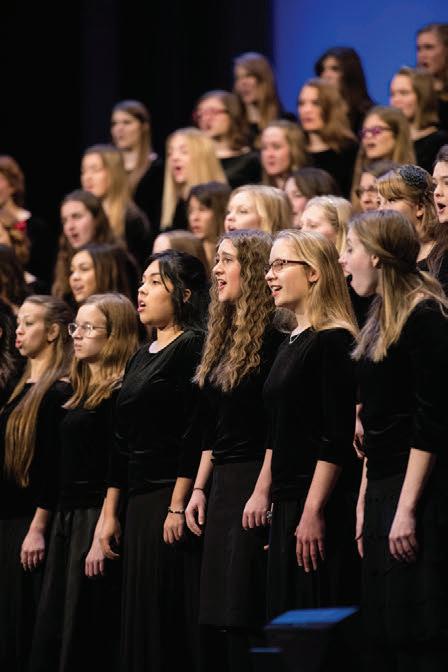
Goals for Learning: Identifying what you hope your individual students or the overall ensemble will achieve dur ing the learning process for the selection can be instructive. For instance, are you attempting to introduce a new time sig nature or key signature? Or will you be introducing metric modulation or mak ing key changes? Are you introducing new vocabulary or various articulations? Will
lenges for your students? Have you nar rowed these areas of concern to that of individual students, sections, or the entire class or ensemble? Have you considered supplemental material to assist with learn ing? What questions could you expect to receive from your students regarding the music? And, have you prepared effective questioning techniques for your musicians to develop their critical thinking skills while engaging, motivating, and evaluat ing them as learners?
Preparing a beneficial and creative introduction can be a great way to entice your students to want to perform each new selection with enriched understanding, enthusiasm, and musicality. 0
Lori Schwartz Reichl is an author, educator, consultant, and founder of Making Key Changes. Learn more online: https://MakingKeyChanges.com.
This article originally appeared in InTune Monthly Vol. 17, No 5, and is reprinted here with permission.

Being intentional about the culture we rebuild, as we emerge from the last two years, could very well be our institutional legacy.
As the rhythm of the academic year settles into a more predictable groove, I hope you and your students are off to a great start. Despite the continuing surprises and cul tural shift resulting from the pandemic, I’m encour aged by the optimism of my colleagues and students. We seem to have found more steady and stable ways to navigate the academic path.
I’m still a bit surprised by the apparent loss of institutional knowl edge. Not only did I predict this would happen, but I also thought I had prepared for it. However, I find that I’m still caught off guard when things don’t easily work as they have in the past. Much of this impinges on the important and nebulous quality of culture. Being intentional about the culture we rebuild, as we emerge from the last two years, could very well be our institutional legacy. I’m trying to see all those little system glitches as opportunities to change and build quality. The encouraging news, whether they have thought it through conceptually or not, is that almost everyone is committed to building structures and procedures that are effective. I’m convinced we are going to emerge from the pandemic stronger than we began.
I’m very excited to share more information with you about the upcoming College Division Fall Conference. As you know, we have met virtually for the last two years. This year, we are returning to Austin for an in-person meeting, and I hope you plan to be there. Read on for a pre view of the event, and email me at collegevp@tmea.org to let me know you’ll be there.
October—Renew your membership and register for the convention.
October 15— Deadline for online submission of poster session proposals.
October 1 —TMEA College research proposal grant application deadline.
October 6, 6 a.m. CT—TMEA convention housing reservation system opens online.
October 14 —TMEA College Fall Conference in Austin.
January 19 —TMEA convention early registration deadline.
February 8–11 —TMEA Clinic/Convention in San Antonio.
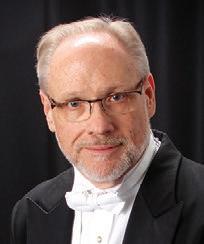
All TMEA College Division mem bers are invited to participate in the Fall Conference. We are planning an engag ing and timely program to address impor tant issues and solicit your thoughts as we address several important concerns. We will have multiple presentations offered by a variety of speakers.
Of course, EdTPA and teacher certifica tion will be an important part of the day’s discussion. I believe we are headed in a positive direction, but the ongoing conver sation is critical to the continuing process. We are working to get our voices heard and we hope to have new information and an opportunity to engage with represen tatives from TEA at the conference. I am grateful for all College Division members who have contributed to TMEA’s state ments and helped to position us to work with our education colleagues around the state to guide this discussion into a posi tive outcome. This is a critical concern for teachers, students, parents, and all con stituents of Texas public education. The College Division is TMEA’s resource and voice as we seek to make sure that future music and arts educators are prepared and certified in a way that appropriately reflects and ensures professional standards.
The Texas Legislature returns to Austin in January 2023, and Robert Floyd and the TMEA office are working diligently to prepare. TMEA has continued its collabo ration with Texas Music Administrators Conference as creators of the Texas Arts Education Campaign to inform voters and policy makers about the role of fine arts education in the well-rounded education of every student.
TMEA governmental relations consul tant Matt Matthews and his colleagues are also an integral part of our work with the legislature. Matthews will be with us to discuss the issues, agendas, and con cerns for the legislative session. I believe this will be an engaging and insightful presentation that will help prepare us to understand and assist in the upcoming conversations.
Recruiting and retaining teachers, especially music educators, is vital to the future of education. The pandemic has brought this issue into focus and garnered a lot of media attention. All who have been preparing educators know that this prob lem developed well before the pandemic.
The last two years may have exacerbated or highlighted the situation, but it is not the root cause. TMEA is committed to help ing and working with others who have a significant stake in educator preparation to address this perennial need. One of our important partners, the Texas Music Administrators Conference, is also work ing hard to find answers and encourage young teachers. I’m delighted to inform you that Dinah Menger and Joe Clark will join us to share their efforts and talk with us about ways we can work together. Most of you know them well, but for those who are new, I have included a short biography of each below.
As we have in the past, we will also meet in our committees and receive an update on their work. We will also have time to speak together as colleagues to discuss issues that concern the College Division as a whole. I believe this is going to be a valu able and enjoyable session, and I encour age everyone to join us in Austin!
Dinah Menger recently retired as Fort Worth ISD Director of Vocal and Elementary Music, over seeing 134 music programs.

Prior to her appointment in Fort Worth, she served as conductor/ lecturer at Baylor University (2013–2015) and was the Choir Director at Arlington HS (1995–2013). Menger’s passion for pub lic school education has led her to work in organizations that promote and support equitable fine arts programs for all teach ers and their students. She has served in leadership roles, including President, in the Texas Music Educators Association, the UIL Prescribed Music Committee, the Texas Music Adjudicators Association, and the Texas Music Administrators Conference. Menger received her BFA from the University of Arizona and her Master’s in Conducting from Texas State University. She is a frequent UIL judge, clinician, voice teacher/coach, teacher consultant, and professional development presenter.
Joe Clark is in his 24th year in education and his 10th year as the Director of Performing and Visual Arts for Spring ISD in
Houston. He earned his BM in music and his MM in conducting from Sam Houston State University and his EdD in Educational Leadership from the University of Houston. Prior to adminis tration, Clark served as a band director in several schools in Spring ISD as well as in Industrial ISD. While in these positions, his ensembles received best-in-class awards at concert band and jazz festivals and earned UIL sweepstakes awards. While at Spring HS, he co-directed Midwest Clinic performances in 2008 and 2009 and led

the Spring HS Jazz Ensemble at the 2010 Midwest Clinic.
As a strong advocate of fine arts and arts integration, Clark remains active as a clinician, guest lecturer, and mentor for young teachers as well as an active UIL adjudicator. He is also proud to cur rently serve as the Past-President of the Texas Music Administrators Conference (TMAC) and Co-chair of the Texas Arts Education Campaign.
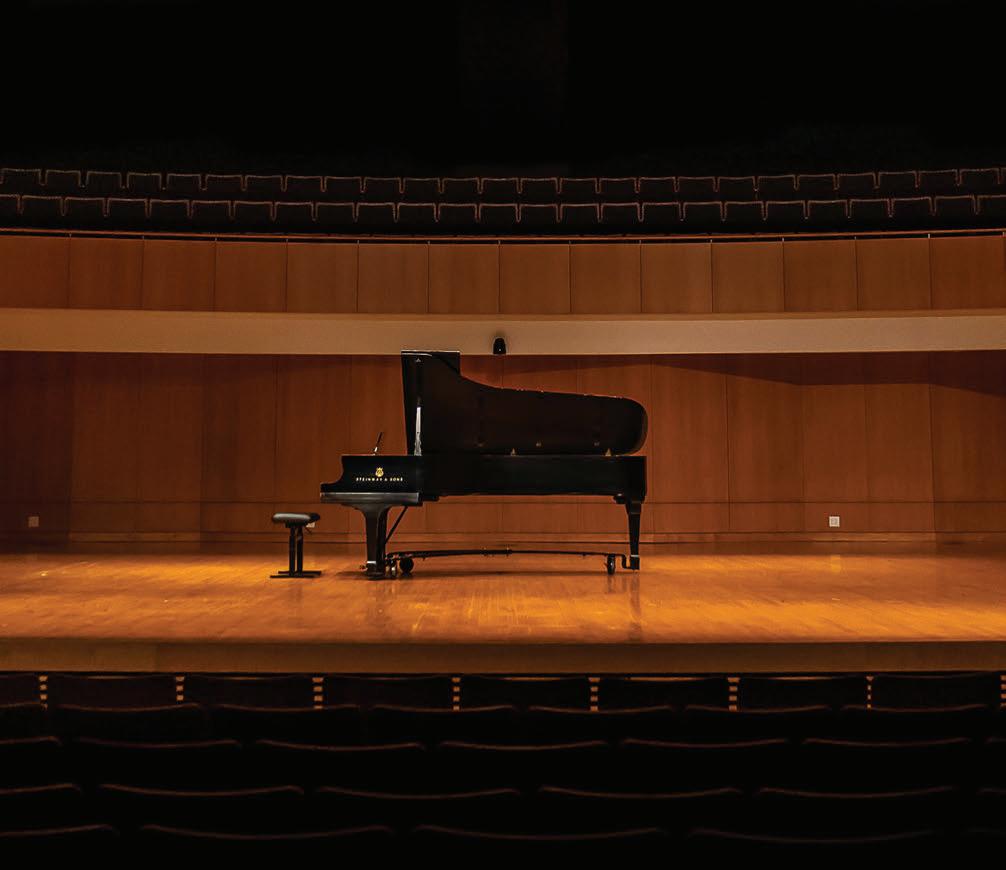
The Executive Board is working hard
to prepare the 2023 TMEA Clinic/ Convention. I believe this is going to be an excellent meeting, and I am grateful to everyone in the College Division who is continuing to participate in this work. I want to encourage you to attend and to engage with your colleagues throughout the state who will be participating. If you have not yet registered for the convention or renewed your membership, please do that now at www.tmea.org/register.
TMEA’s housing reservation system for members opens October 6, at 6 a.m. CT.
Email alert: The week of October 6,
TMEA will send members an email from membership@tmea.org that contains the preferred link to use the day we open reser vations, so you experience the best website responsiveness. As always, before clicking on links in any email, check the full email address to verify its legitimacy. Each year, members and exhibitors report receiving scam and phishing emails that are related to our event.
When you register, please consider con tributing to the Scholarship Fund. Your generous donations allow TMEA to invest in the future of music education and the music profession by supporting our next generation of college students. As mem bers of the College Division, our profes sional lives are devoted to helping stu dents succeed. Contributing to the TMEA Scholarship Fund is a tangible way of put ting this into practice.
A tremendous example of the TMEA’s scholarship investments are the student teaching scholarships. Please make your students who will be student teaching in 2023 aware of this opportunity. These gen erous awards help students through one of the most critical parts of the preparation. For more information and to apply, go to www.tmea.org/scholarships.
Biographies of our College Division Featured Clinicians Rachel Dirks and Karen S. Hendricks were published in last month’s magazine. The focus of their pre sentations at our convention will be health and wellness in our profession. The vari ous sessions will examine this timely and important concern from the points of view of the teacher and the student, as well as our culture and profession. I’m delighted they are joining us and am looking for ward to learning from them in February. Don’t miss Hendricks’s article in this month’s issue on page 42.
I want to again thank all our colleagues who have been contributing such excellent thought and cogent words to help TMEA articulate our position on certification. It is always challenging to explain the arts and their intrinsic value to people who are not practitioners of our disciplines. We all owe a debt of gratitude to our colleagues and the TMEA staff who have embraced this challenge in an exemplary fashion.

